

The 9th Asian Winter Games is being held in Harbin, capital city of Northeast China's Heilongjiang province from Feb 7 to 14.
Over 1,200 athletes from 34 countries and regions across Asia compete in the Games, making this edition the largest in terms of participating delegations and athletes.
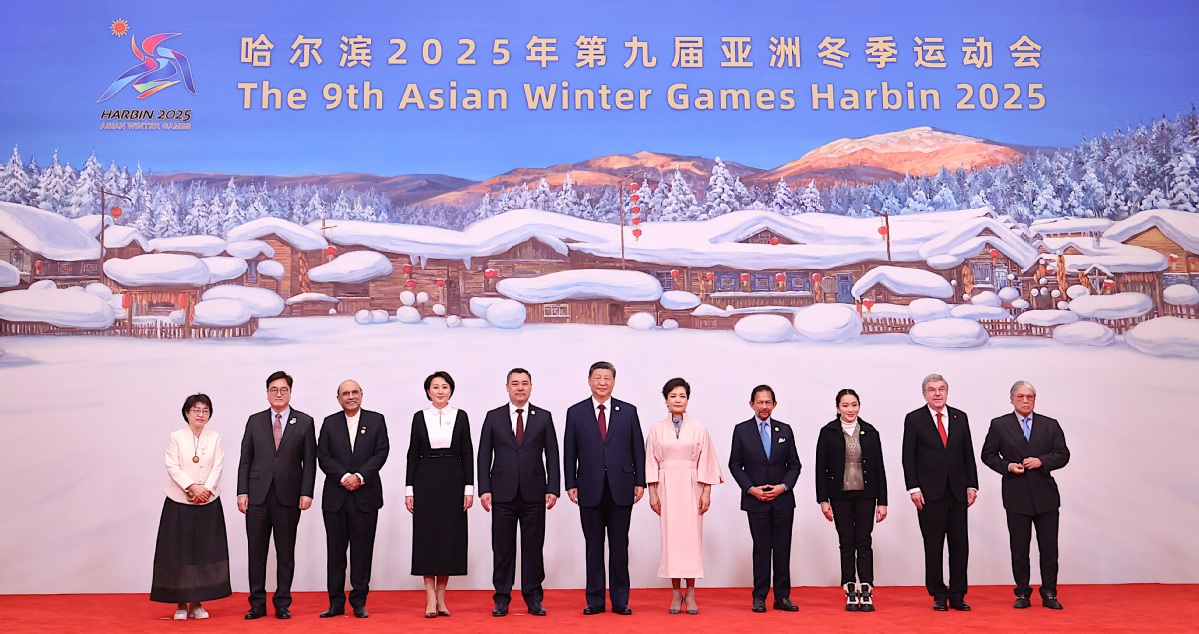
President Xi Jinping called on Friday for collective efforts to pursue the shared aspirations of the Asian people for peace, development and friendship, as he and his wife, Peng Liyuan, received foreign leaders and representatives of international sports organizations ahead of the opening ceremony of the 9th Asian Winter Games in Harbin, Heilongjiang province.
Addressing a welcoming banquet ahead of the opening ceremony, Xi said peace is as pure as ice and snow. "No matter how the international landscape evolves, we should join hands together to meet all kinds of security challenges and contribute Asian strength to building an equal and orderly multipolar world," he said.
Xi underscored the significance of collaboration in promoting progress and development, and emphasized the need to sustain the drive for universally beneficial and inclusive economic globalization.
"Winter sports are fascinating because they require passion and collaboration," he said.
Speaking on a snowy day, Xi drew parallels between the uniqueness of every snowflake and the distinctiveness of civilizations, highlighting that Asia is a convergence of diverse civilizations.
"We should promote inclusiveness, coexistence and mutual learning, and contribute more to the development and progress of human civilization," he said.
With a theme of "Dream of Winter, Love among Asia", the 9th Asian Winter Games are taking place in Harbin, known as China's "Ice City" and the cradle of China's modern winter sports. The Games, which will run through Feb 14, have set a record for the number of participating countries, regions and athletes.
The Games are also the latest international comprehensive winter sports event held in China, following the 2022 Beijing Winter Olympics, which contributed to China's goal of involving 300 million people in ice and snow activities.
"From the Olympic Winter Games Beijing to the Asian Winter Games Harbin, the passion in China for ice and snow has swept across the nation," Xi said. "It has also invigorated winter sports around the world."
He expressed confidence that Harbin would deliver to the world a sports gala that is distinctly Chinese, uniquely Asian and spectacular, thus writing a new, magnificent chapter of ice and snow sports.
Xi said that the ice and snow culture and economy are becoming a new driving force for the high-quality development of Harbin and a new bond linking the city and the world.
"We welcome you to explore this hospitable, open and inclusive land of black soil, and to trace the path of Chinese modernization," he said.
In the Year of the Snake, which began on Jan 29, Xi extended his wish that all athletes will have excellent performances with the agility of a snake.
Sultan of Brunei Haji Hassanal Bolkiah Mu'izzaddin Waddaulah, Kyrgyz President Sadyr Japarov and his wife, Aigul Japarova, Pakistani President Asif Ali Zardari, Prime Minister of Thailand Paetongtarn Shinawatra, and the Republic of Korea's National Assembly Speaker Woo Won-shik and his wife, Shin Kyung-hye, attended the opening ceremony. International Olympic Committee President Thomas Bach and Timothy Fok Tsun-ting, first vice-president of the Olympic Council of Asia, were also among the guests.
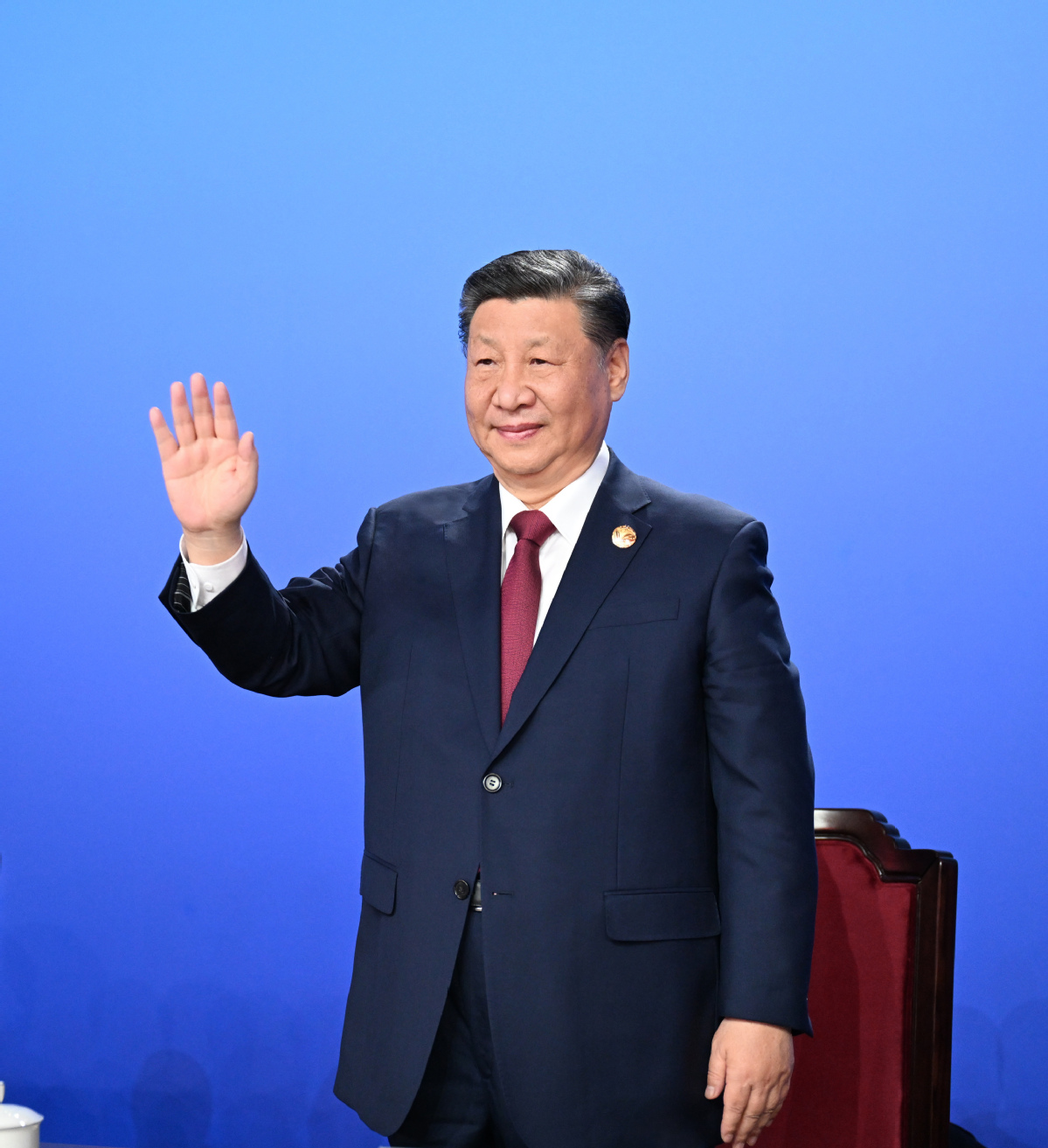
With an extensive display of local culture and a spectacle of high-tech visuals, a stunning gala captured the imagination on Friday night as President Xi Jinping announced the opening of the 9th Asian Winter Games in Harbin, Heilongjiang province.
Almost three decades after hosting the multisports event for the first time in 1996, Harbin, the provincial capital, is providing a bigger and better encore by setting a higher-standard, more inclusive stage for Asia's best winter sports talent. The athletes, from established champions to emerging newcomers, will compete on ice and snow while sharing friendship in Northeast China's "Ice City".
Following the opening performance, which saw 34 children, representing the 34 delegations, light a giant ice lantern together to symbolize Asian unity, Xi announced that the Games, which feature the highest participation ever, were officially underway.
As digital fireworks wowed the 8,000 spectators at the Harbin International Conference, Exhibition and Sports Center, which was the ceremony's main venue, real fireworks lit up the sky above Harbin Ice and Snow World, the show's outdoor secondary venue.
A record number of 1,275 athletes have signed up to compete in Harbin in 64 medal events across six sports — skating, ice hockey, curling, skiing, biathlon and ski mountaineering.
With a giant floor screen lighting the way, the parade of athletes proceeded to the melody of Ice, Snow and Asia, played to the inspiring beat of traditional instruments from across Asia, as delegations marched onto the stage under glittering clouds of suspended silver snowflakes.
During the parade, images of Harbin's scenic mountains and rivers, its iconic ice sculptures and its city flower, the lilac, were projected onto the background screen, allowing visiting athletes and spectators to enjoy the host city's characteristics in an immersive way.
Liang Huiling, president of the 9th Asian Winter Games Harbin Organizing Committee and governor of Heilongjiang, extended her warm welcome to visiting athletes and delegation officials, taking pride in reuniting Asia's best winter sports athletes in Harbin once again.
"Twenty nine years ago, the flame of the Asian Winter Games ignited this city's passion and dream for ice and snow. Today, we are here to jointly witness Harbin become a dual-Winter Asiad city as a continuation of the Beijing 2022 Winter Olympics' legacy," she said.
That legacy has encouraged 300 million Chinese to participate in winter sports, added Liang.
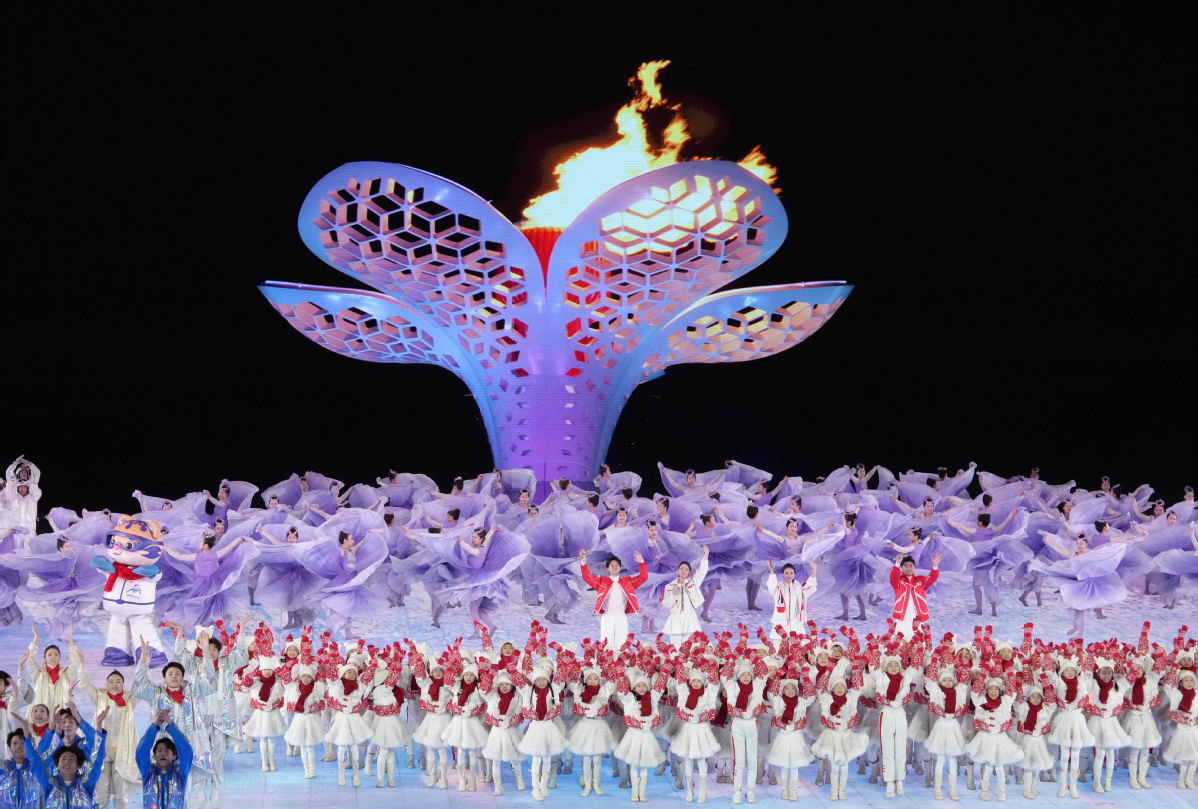
A three-part artistic performance, enhanced by technologies such as virtual reality and glasses-free 3D animation, captured the crowd's imagination with breathtaking projections depicting traditional Harbin images, such as ice harvesting from the frozen Songhua River, and the city's fairytale winter scenes of snow-laden branches glistening like jade amid swirling snowflakes.
Wearing costumes with lights attached, performers on roller skates and junior athletes skating on a real ice track glided onto the stage to depict enthusiastic participation in winter sports in Harbin, a renowned training base for China's ice and snow sports talent.
International Olympic Committee President Thomas Bach, who also attended the opening show of the Beijing 2022 Winter Olympics, said the Harbin event would surely exceed expectations.
"Knowing the expertise of the people of Harbin and of China in organizing great sporting events, the expectations are very high. As I know, China will even exceed these high expectations," he told Xinhua News Agency before the ceremony.
Impressed by the expansion of winter sports across Asia, Bach hailed the impact of Beijing 2022 and Harbin 2025 as a game-changer for ice and snow sports worldwide.
"The Games is part of the legacy (of Beijing 2022), and the development in winter sports in China is just breathtaking," said Bach, who will step down from the IOC after his second term expires next month.
"You could see winter sport athletes from Qatar, Kuwait and Saudi Arabia (in Harbin). And in these countries, this excitement for winter sport is growing. This is how it should be, benefiting from this great legacy of Beijing 2022," he added.
For the exciting finale, a group of children holding ice lanterns skated to the center of the outdoor Ice and Snow World to jointly ignite the Games' cauldron with Zhang Hong, who won China's first speed skating Olympic gold medal at Sochi, Russia, in 2014.
The glow of lanterns and the flame of the Winter Asiad lit up the freezing night in Harbin as the cauldron, named the "Bloom of Ice Lilac", brought vigor and warmth.
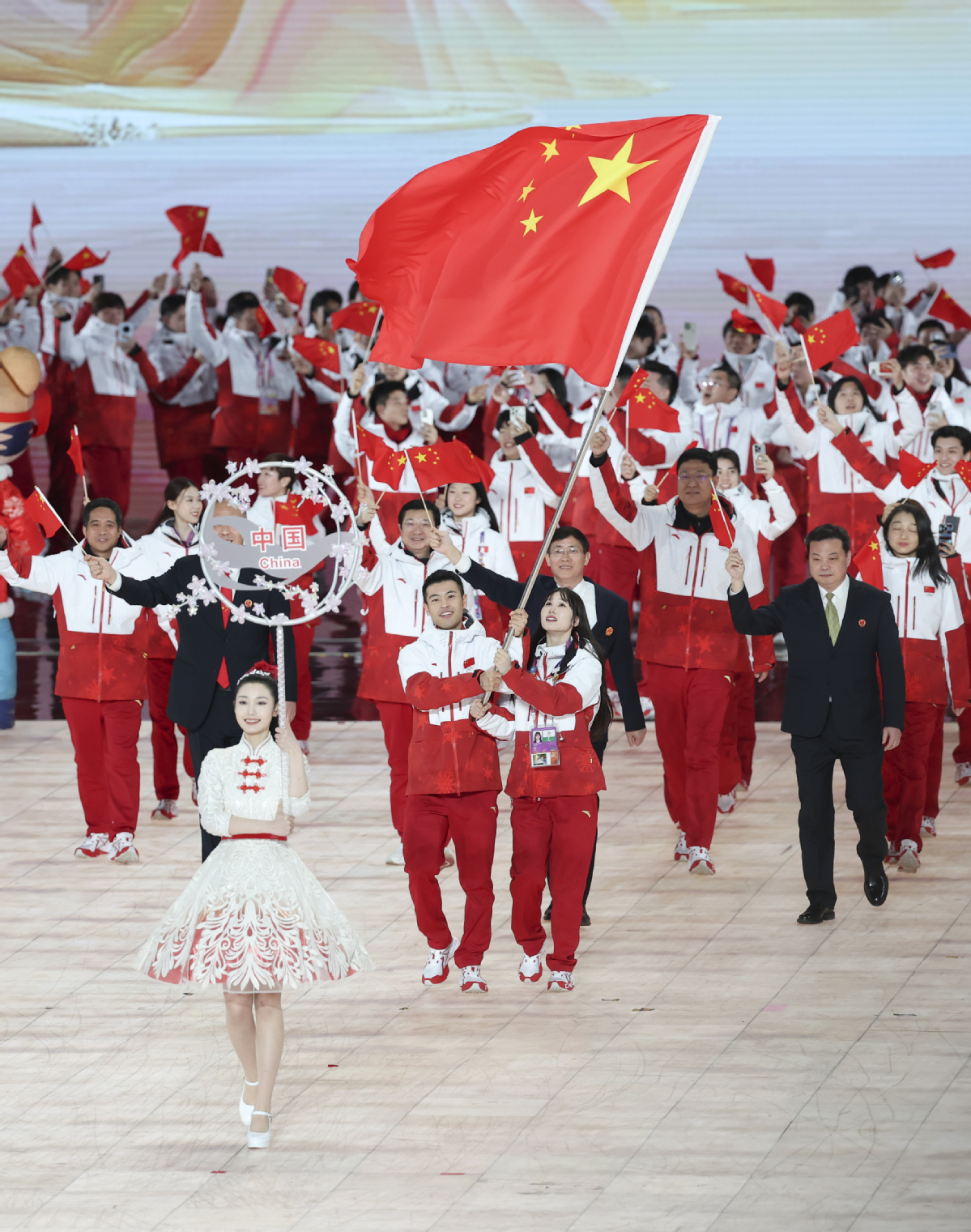
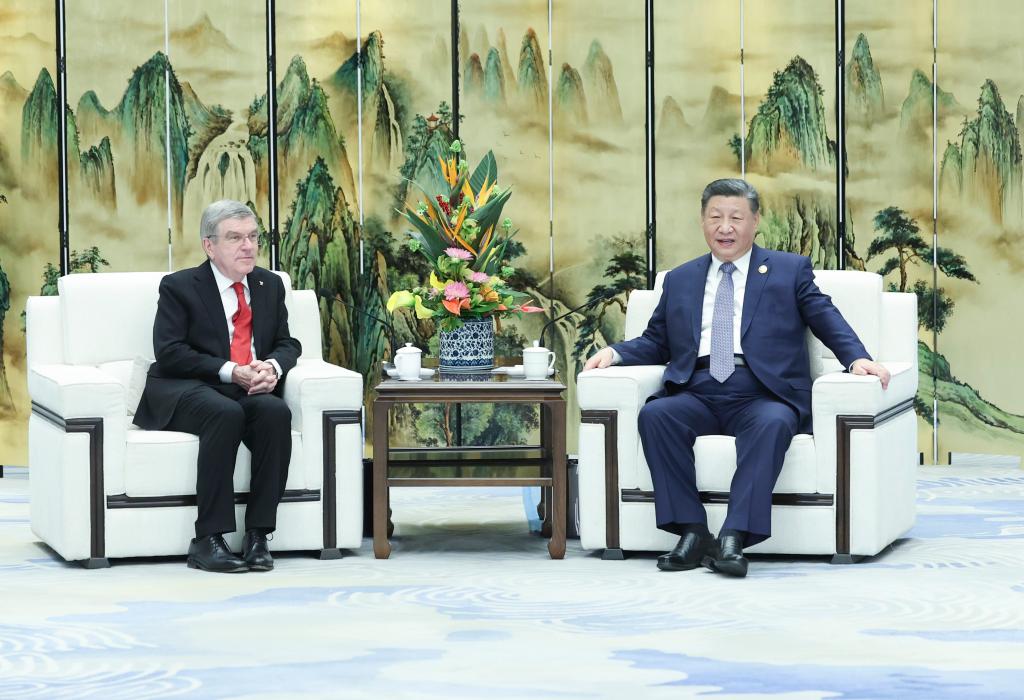
HARBIN -- Chinese President Xi Jinping said Friday that China stands ready to work with the International Olympic Committee (IOC) to continue promoting the development of the Olympic Movement.
Xi made the remarks when meeting with IOC President Thomas Bach in Harbin, capital city of Northeast China's Heilongjiang province. Bach is here for the opening ceremony of the 9th Asian Winter Games.
China's successful hosting of multiple major sports events in recent years demonstrated the close collaboration between China and the IOC, Xi noted.
Xi said that China is vigorously developing its sports sector and moving toward the goal of building a sports powerhouse and a healthy China, which will continuously make new contributions to the development of international sports.
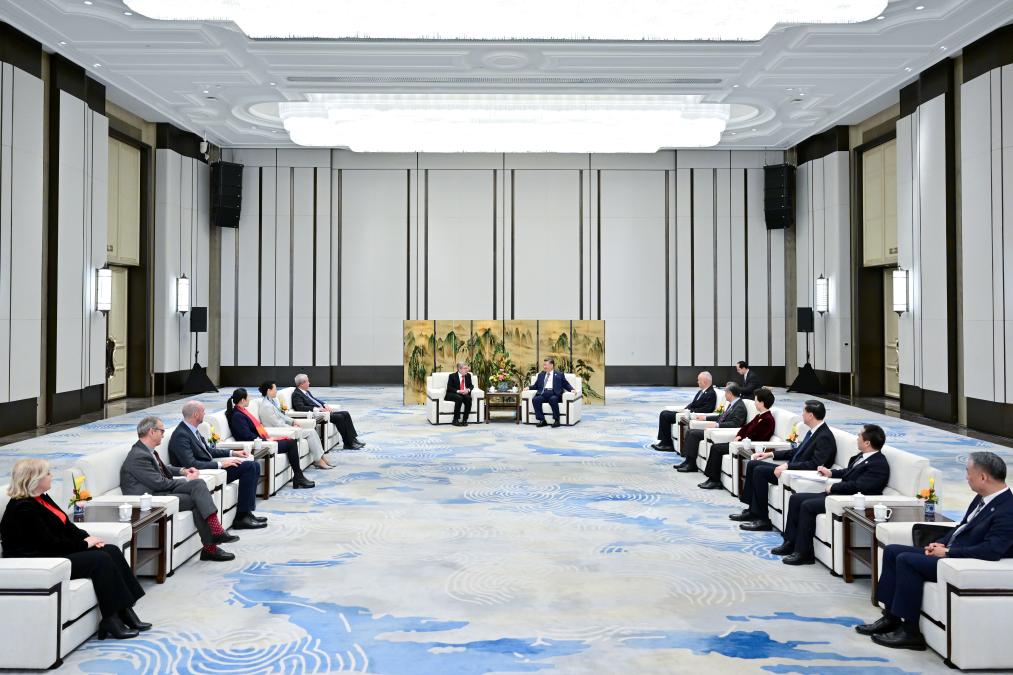
Bach praised China for advocating and practicing the concepts of unity, cooperation, equality and respect, upholding multilateralism, opposing the politicization of sports, and supporting the broad participation of developing countries in international sports.
He expressed the confidence that China will continue to achieve greater accomplishments and make greater contributions to world peace, development and progress.
Senior Chinese leaders including Cai Qi were present at the meeting.
President Xi Jinping opened the 9th Asian Winter Games in Harbin on Friday night during a festive ceremony highlighting the city's ice and snow culture.
HARBIN - The cauldron has been ignited at the opening ceremony of the 9th Asian Winter Games on Friday night.
Joined by children holding ice lanterns, China's first Winter Olympic champion and short track speed skater Yang Yang, China's first male Winter Olympic gold medalist and freestyle skier Han Xiaopeng, Olympic race walk champion Wang Zhen, and Sochi Winter Olympic speed skating champion Zhang Hong lit the cauldron in a shape of a blooming lilac flower at the Harbin Ice-Snow World, the world's largest ice-and-snow theme park.
The flame for the Games was lit at the Sun Island Scenic Area in Harbin on January 20. The torch relay involved 120 torchbearers on a route featuring landmarks in the city, including Harbin Central Street, which has a history of more than 100 years, and the Songhua River.
After the athletes' parade and the official opening of the Games, a gala performance themed "Dream of Winter, Love among Asia" ushered in a climax of the ceremony - lighting of the cauldron.
The Harbin Ice-Snow World is the sub-venue for the opening ceremony, in addition to the main venue at the Harbin International Conference, Exhibition and Sports Center. During this year's eight-day Spring Festival holiday, the Harbin Ice-Snow World saw over 610,000 visits.
It is the second time for Harbin to host the Asian Winter Games, after doing so for the tournament's third edition in 1996. Over 1,200 athletes from 34 countries and regions across Asia will compete in 64 events across six sports, making this edition the largest in terms of participating delegations and athletes. The Games will conclude on Feb 14.
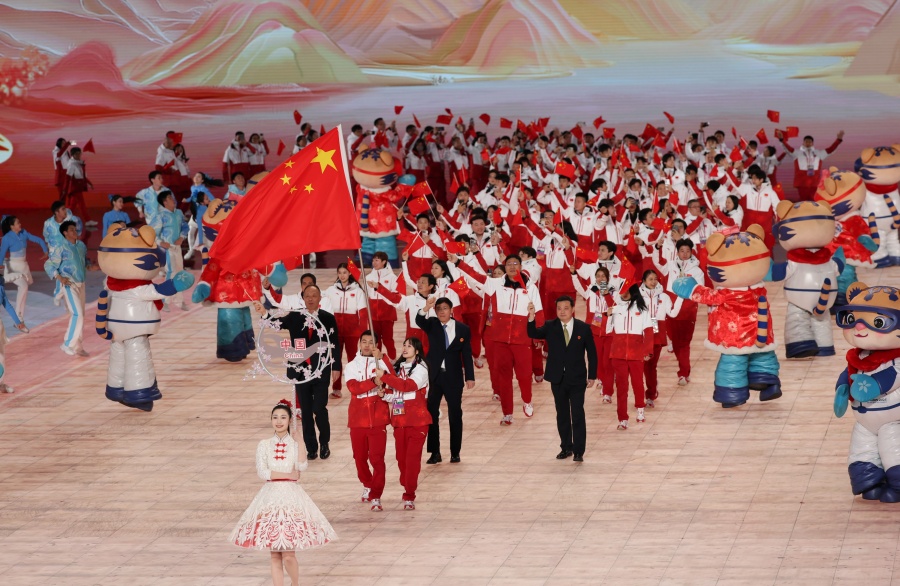
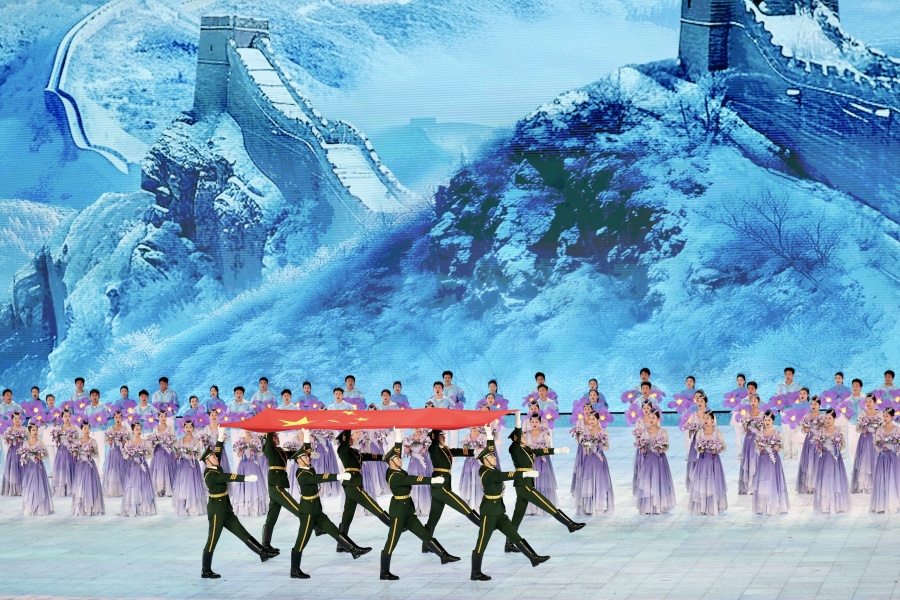
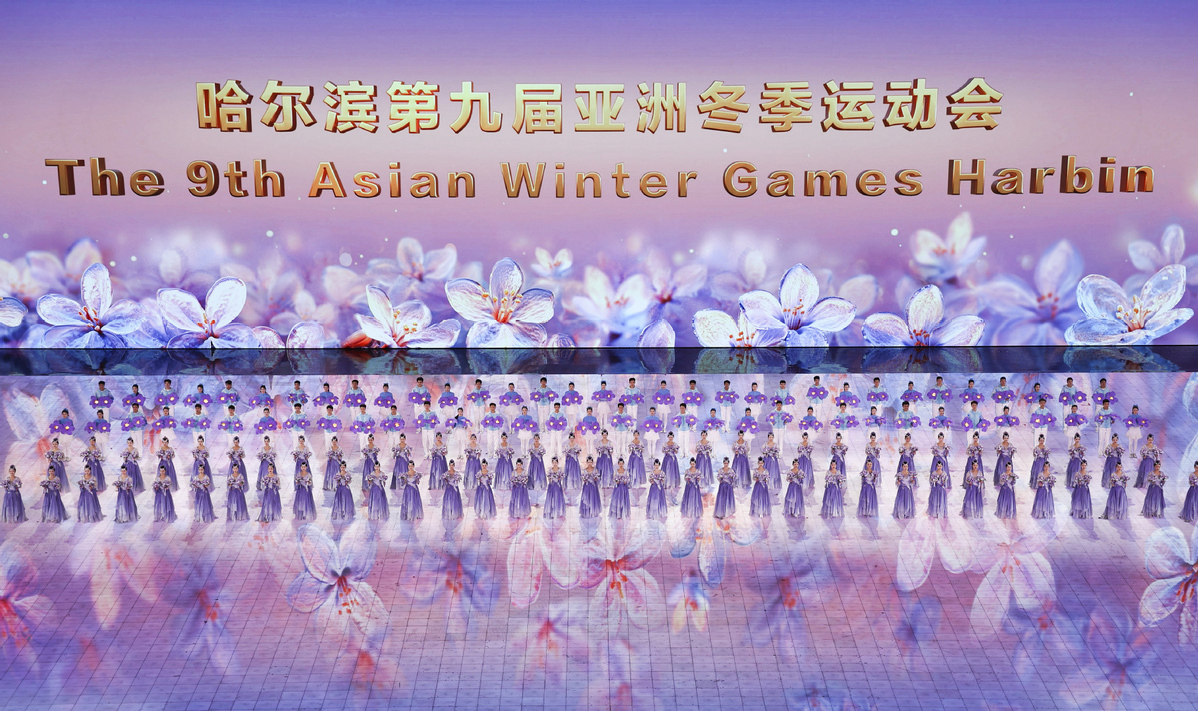
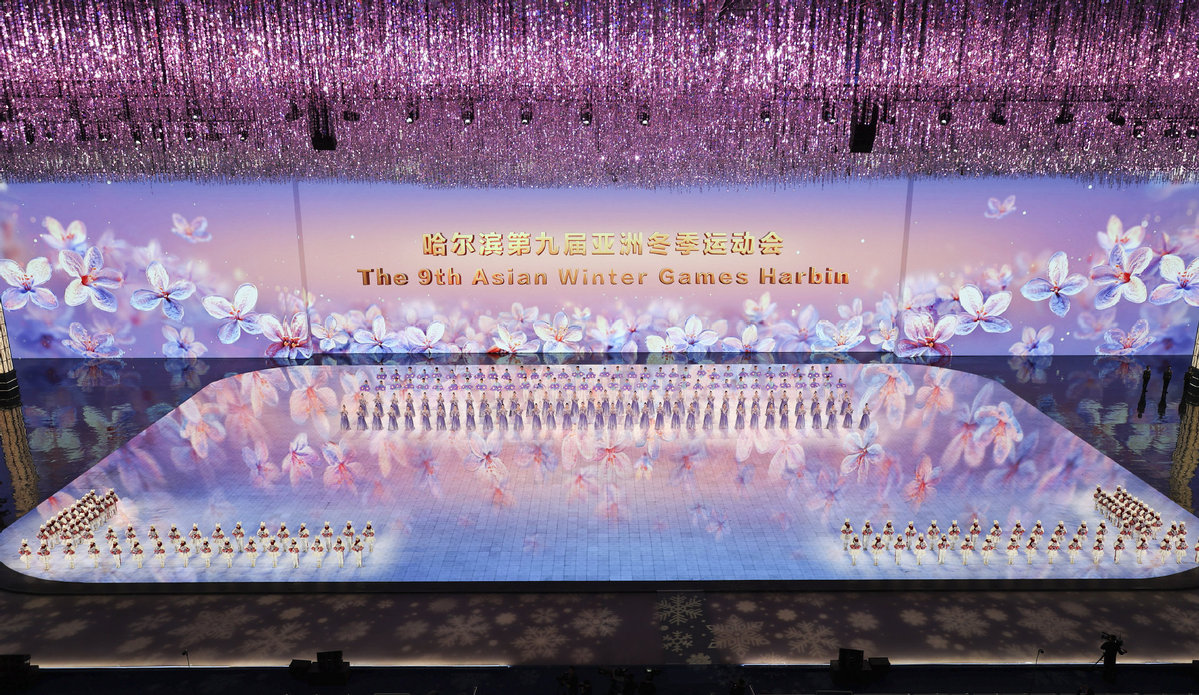
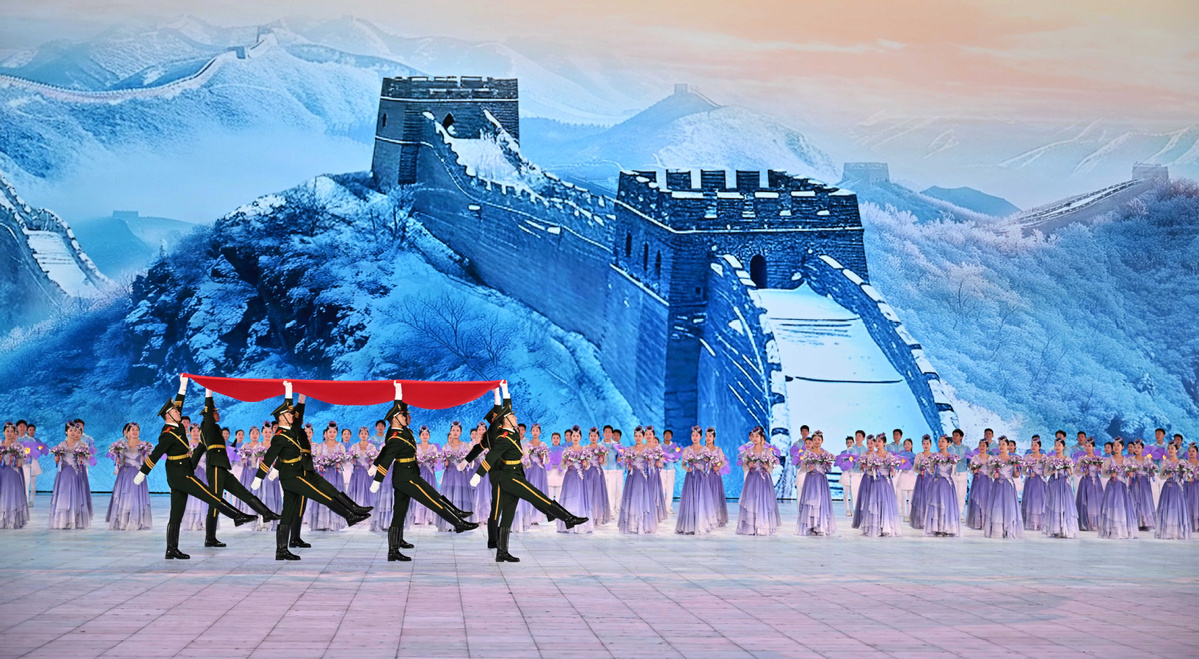
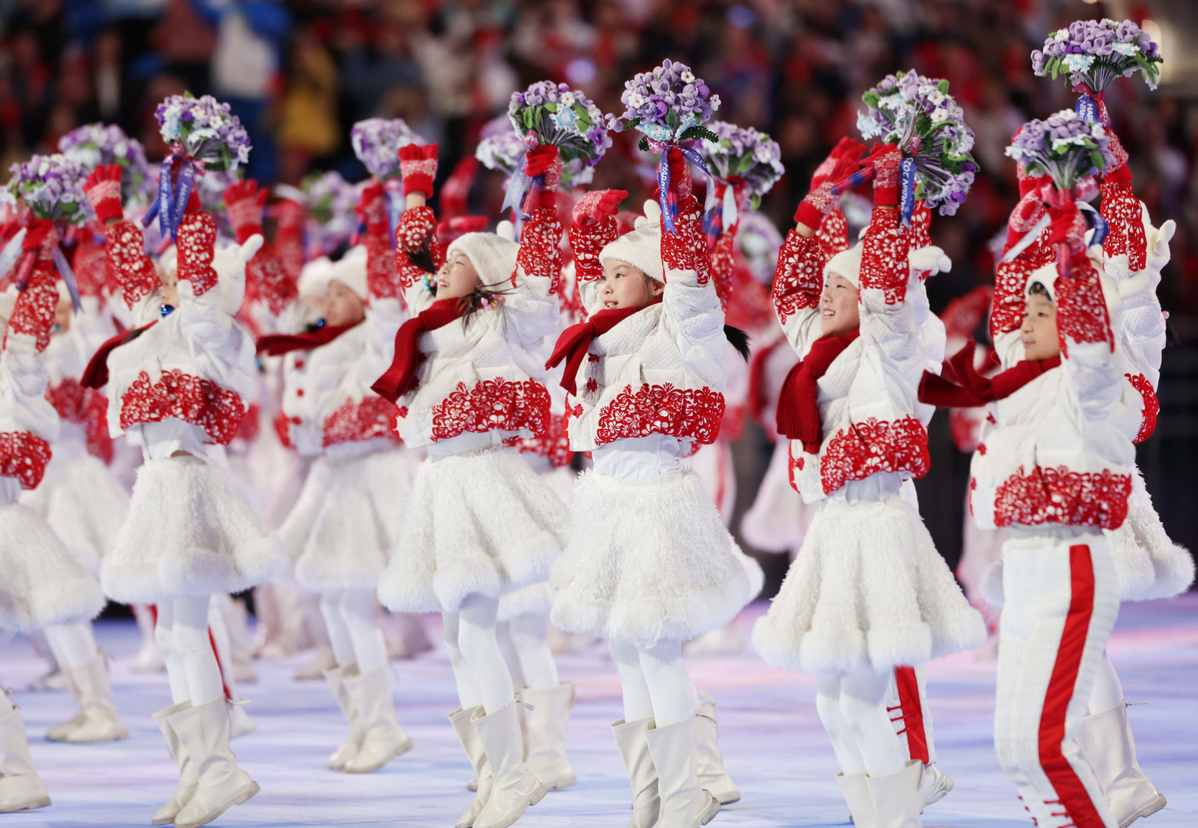
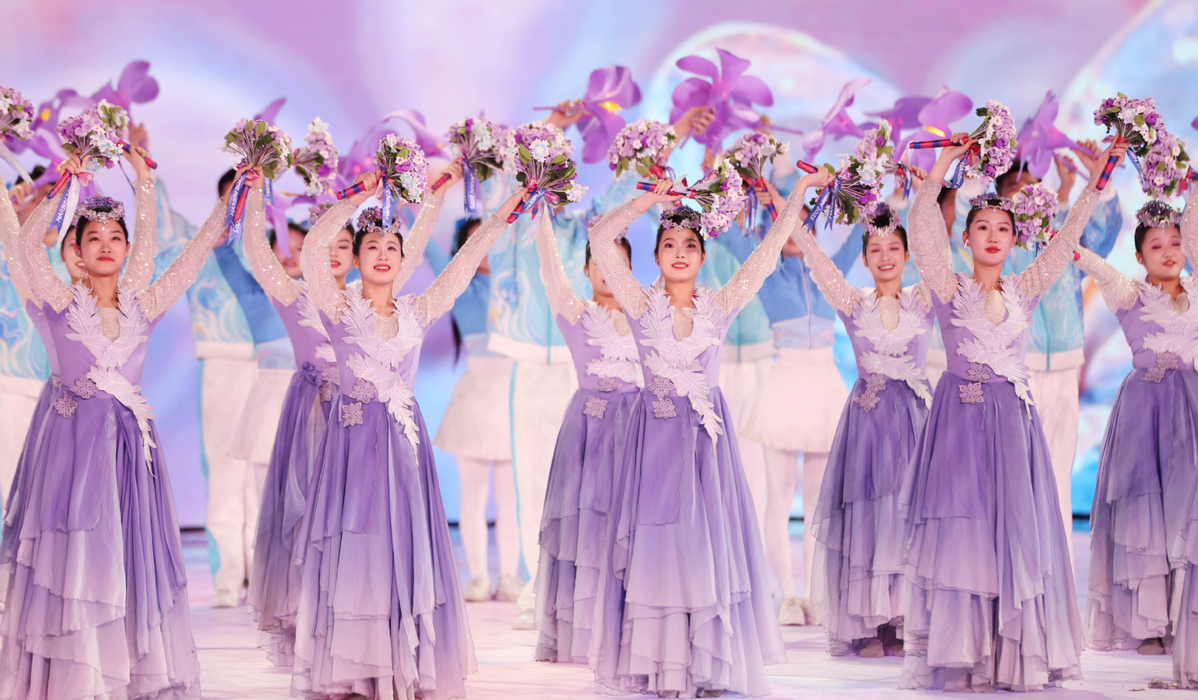
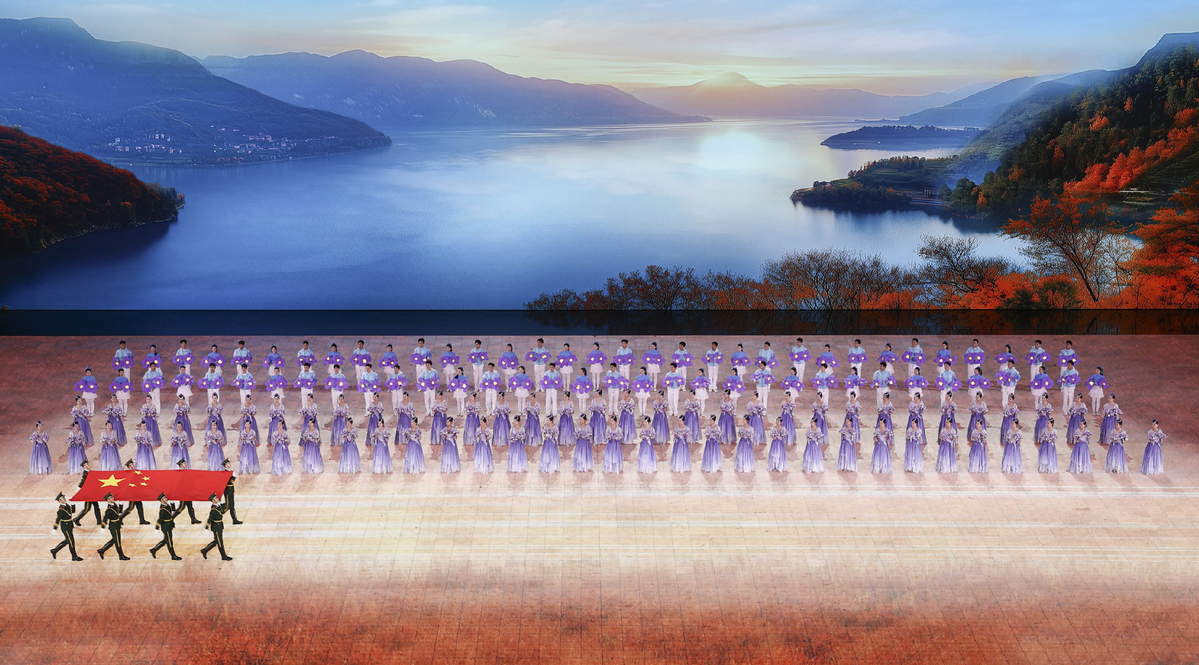
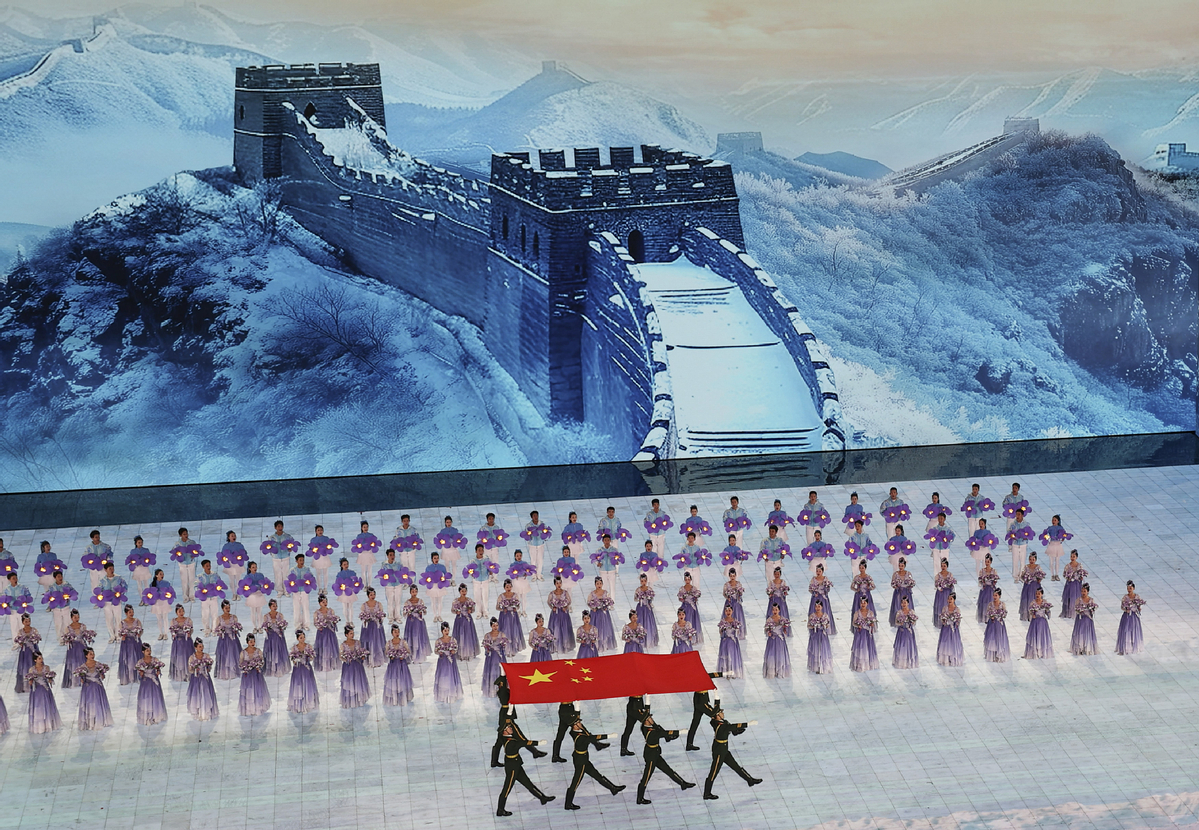
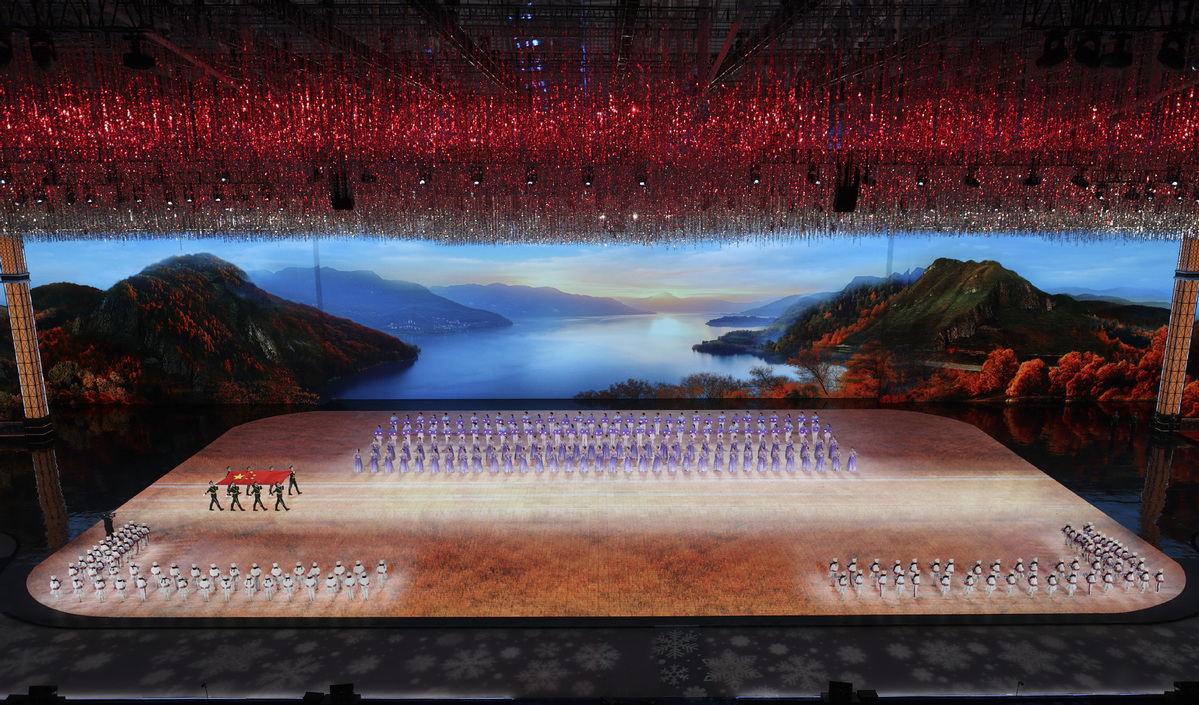
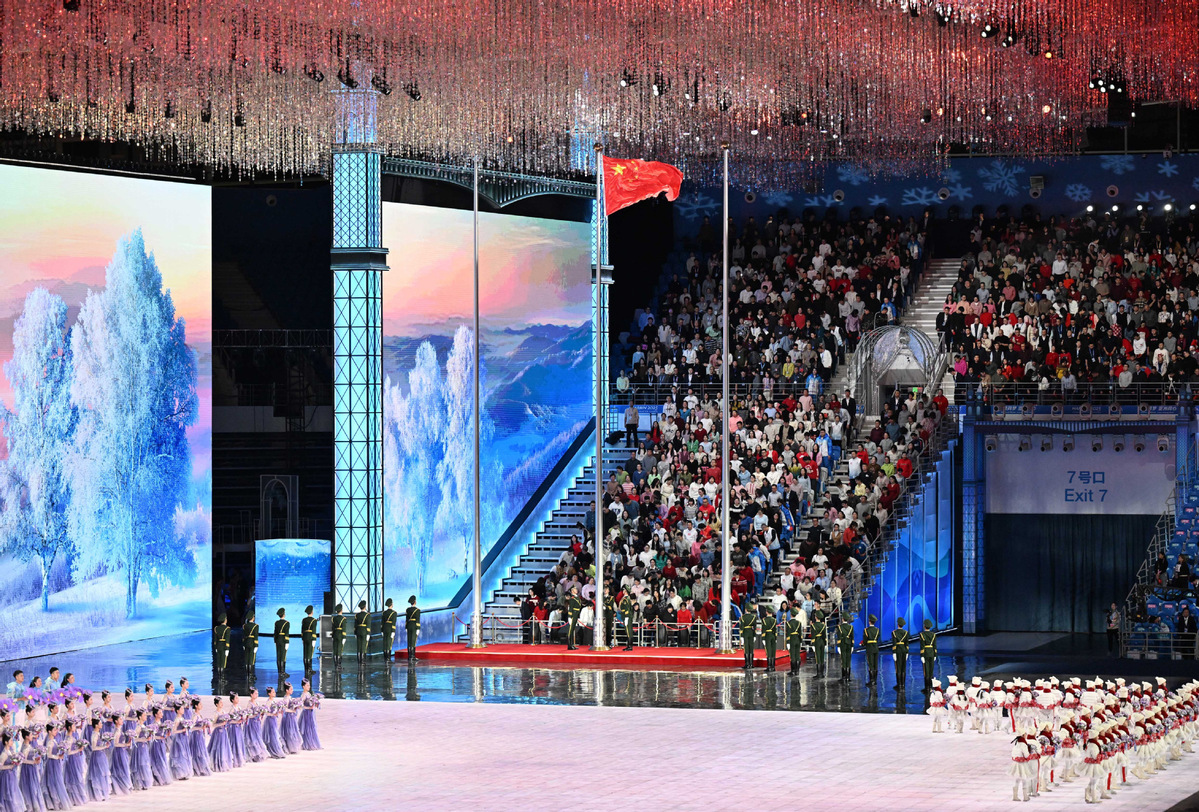

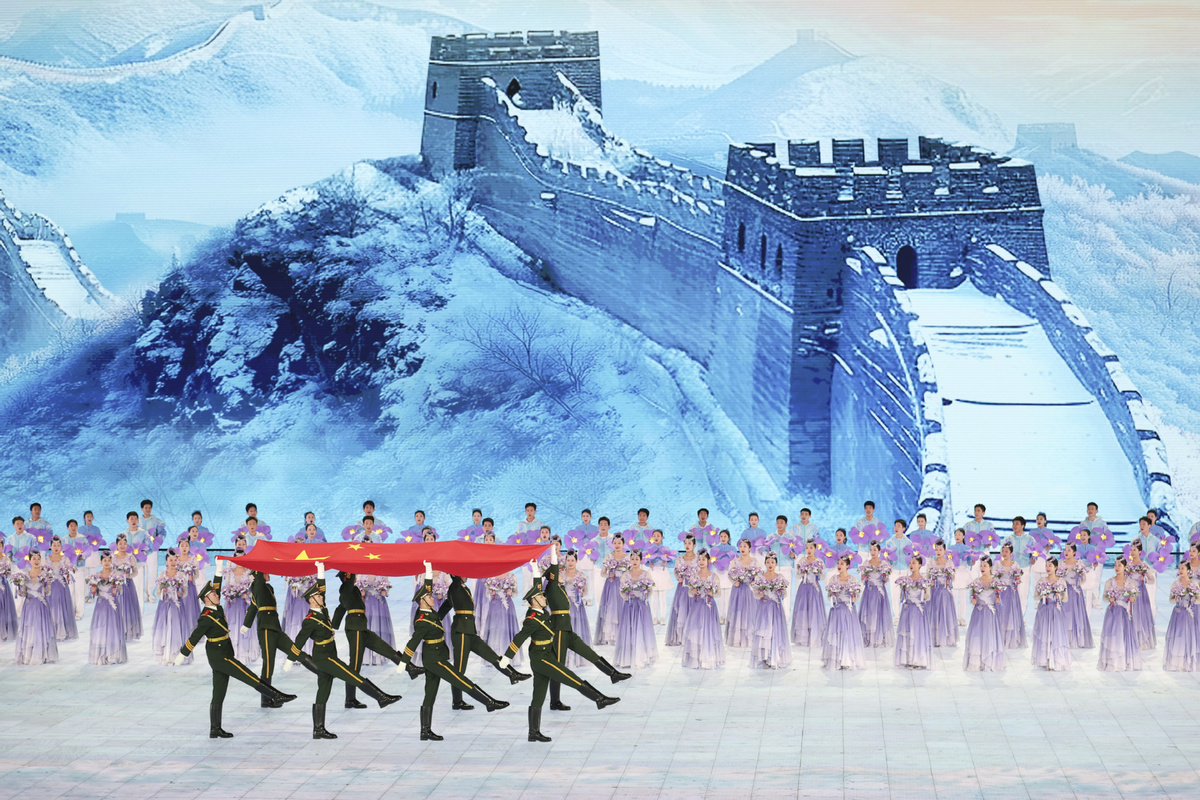
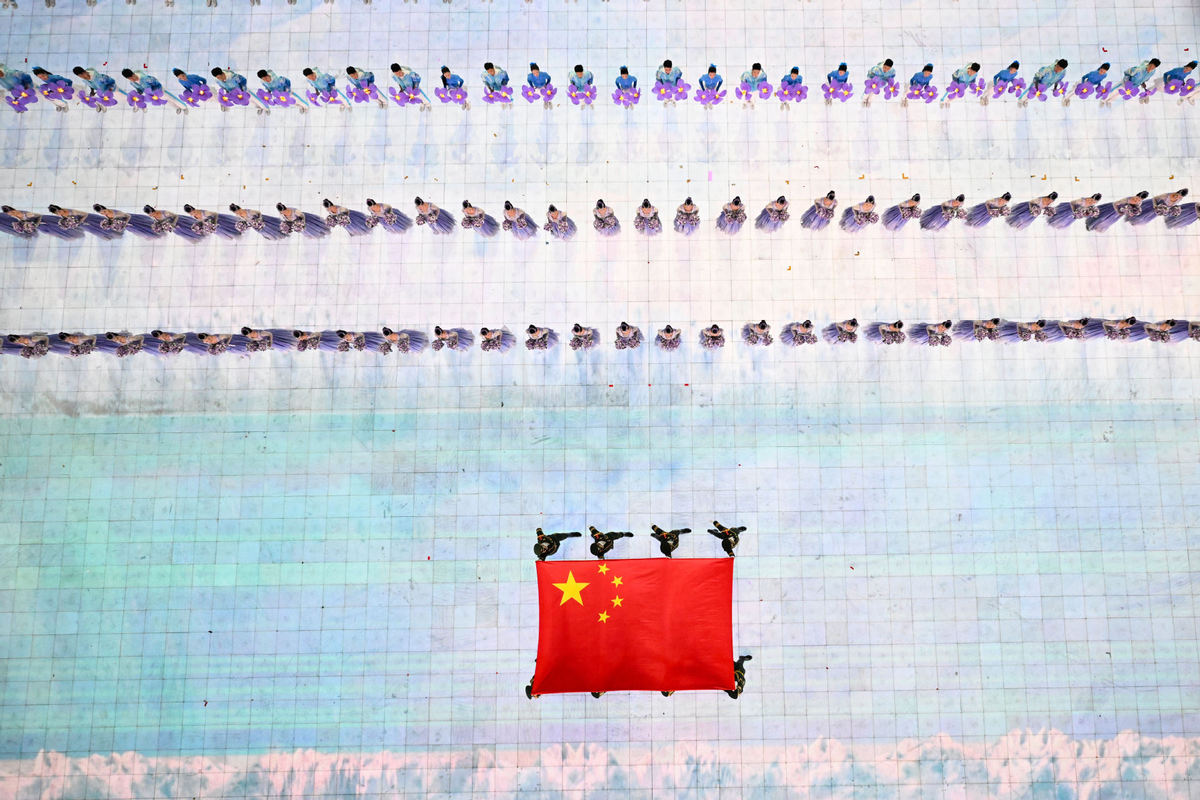
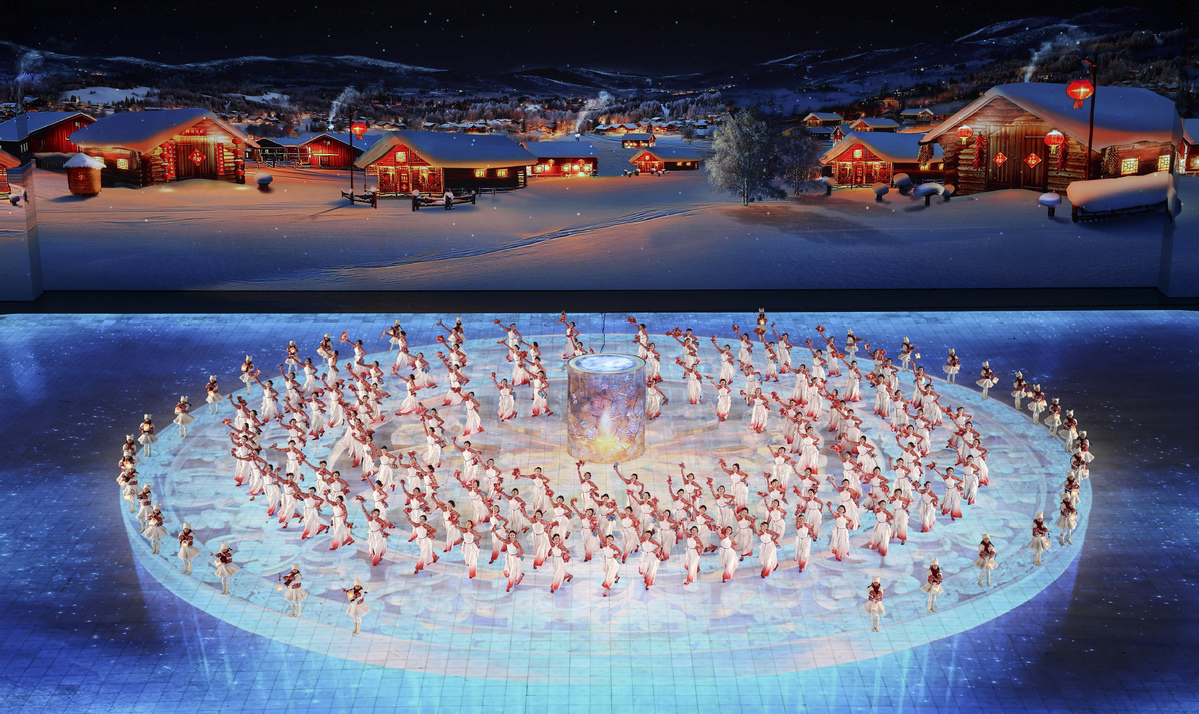


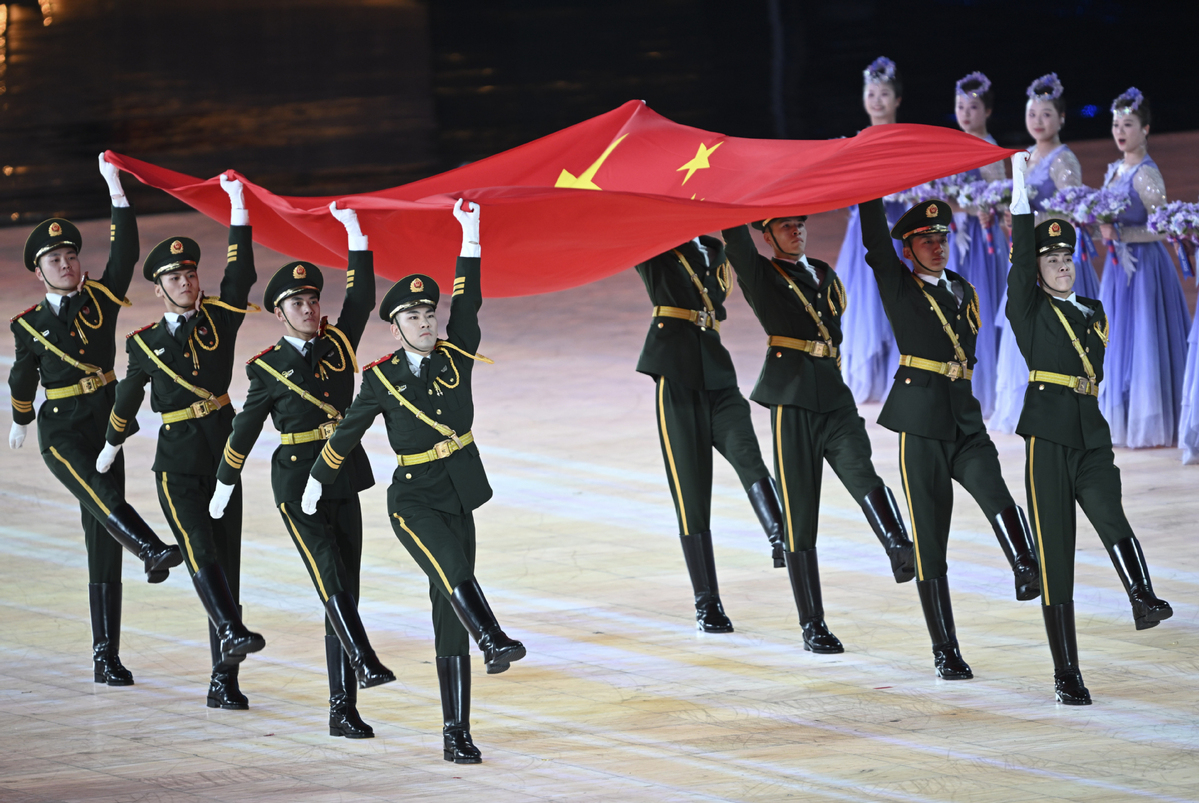


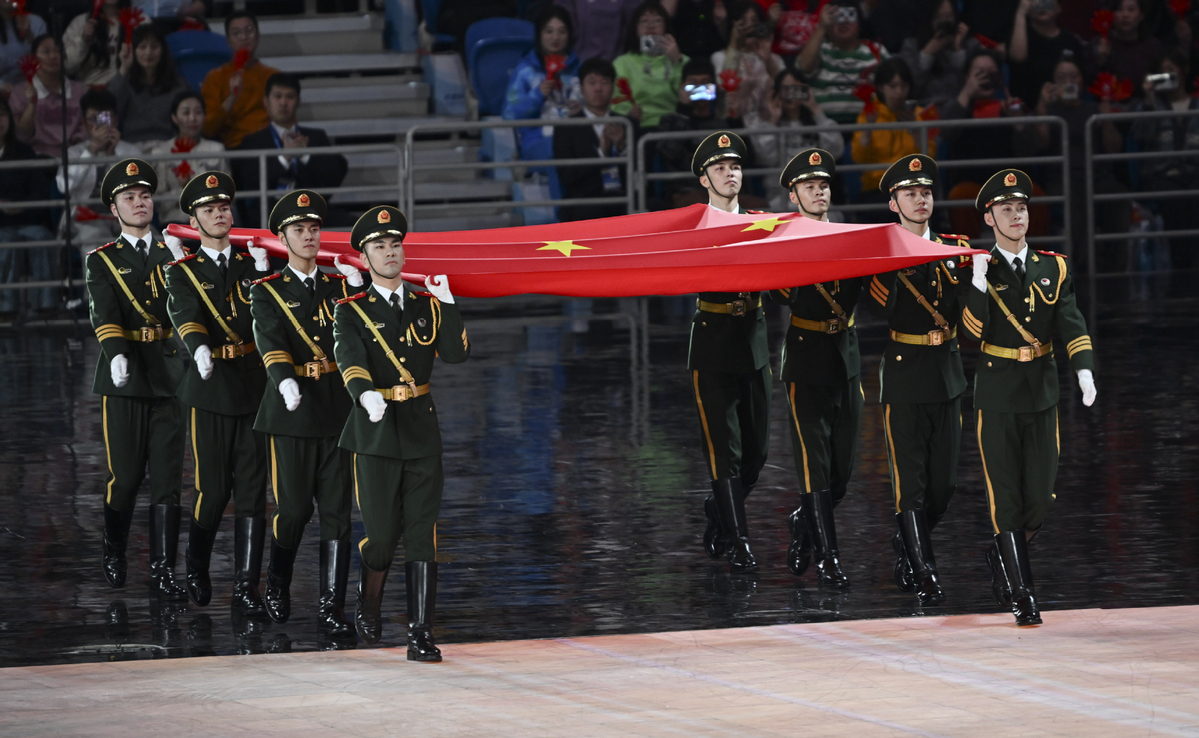
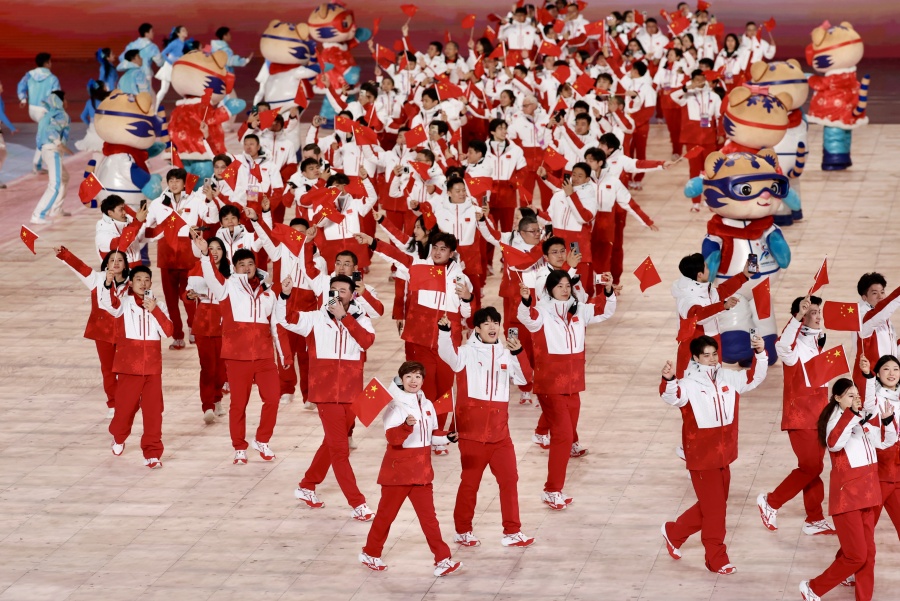
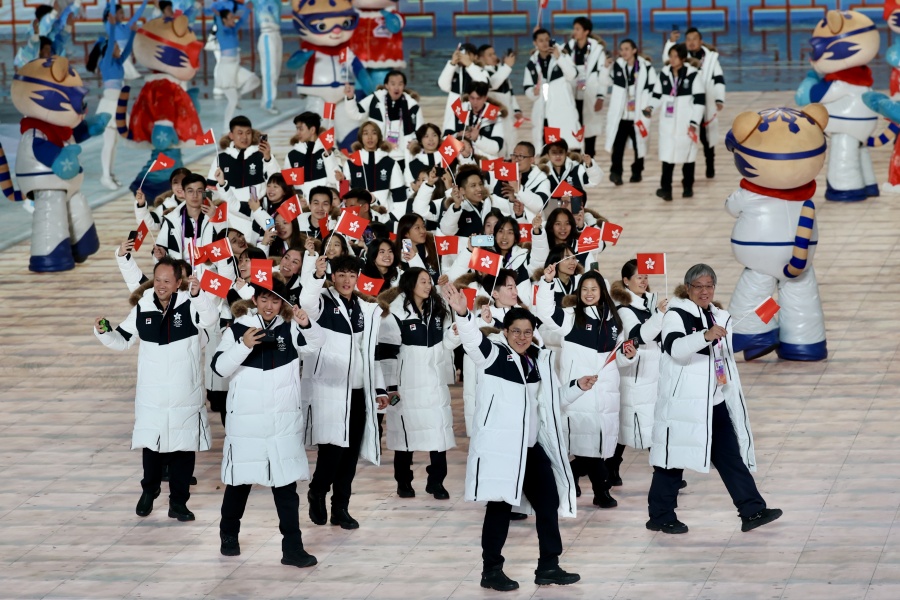

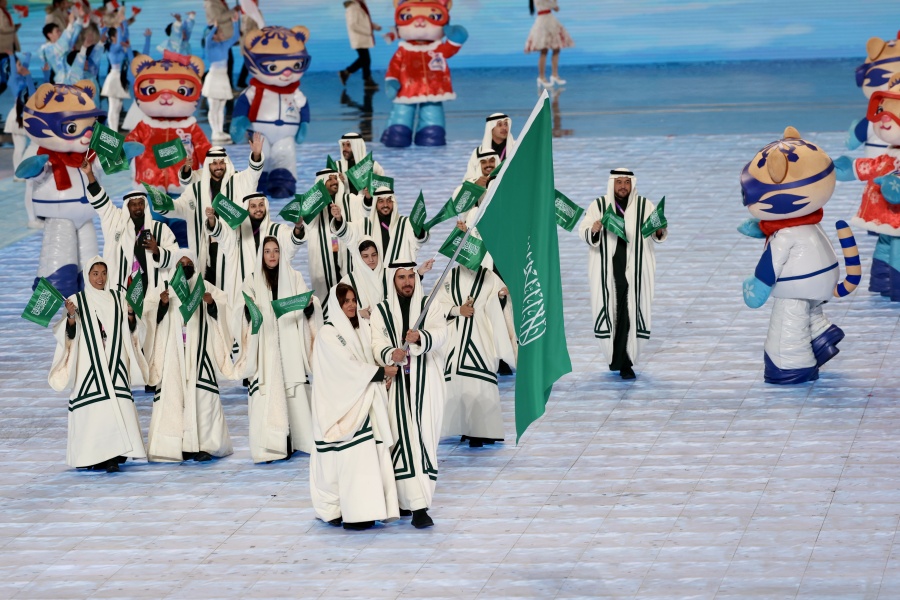
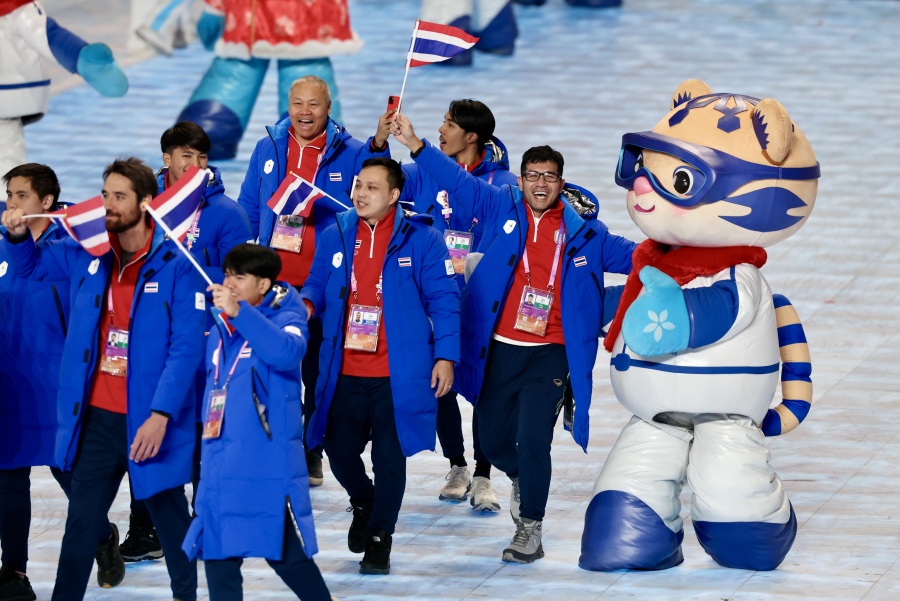
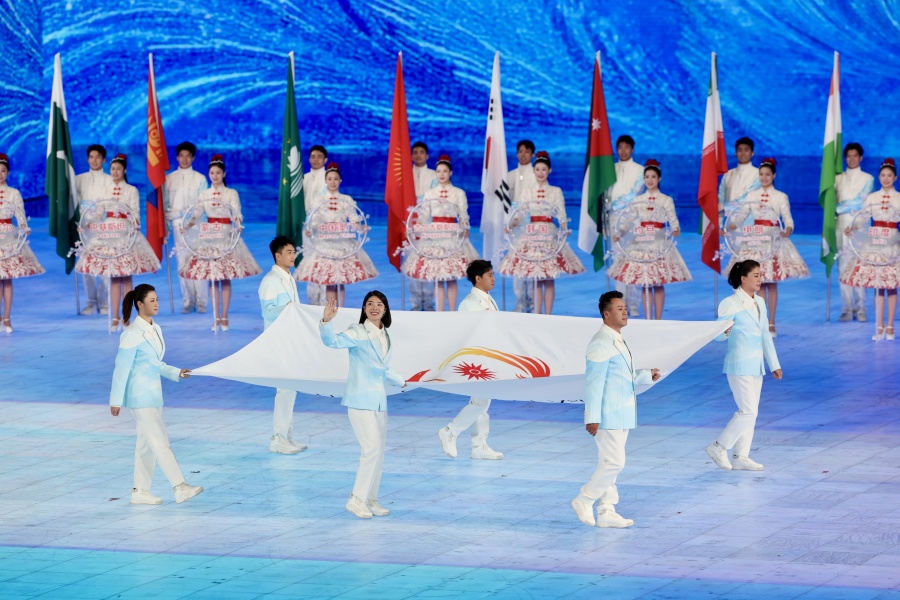
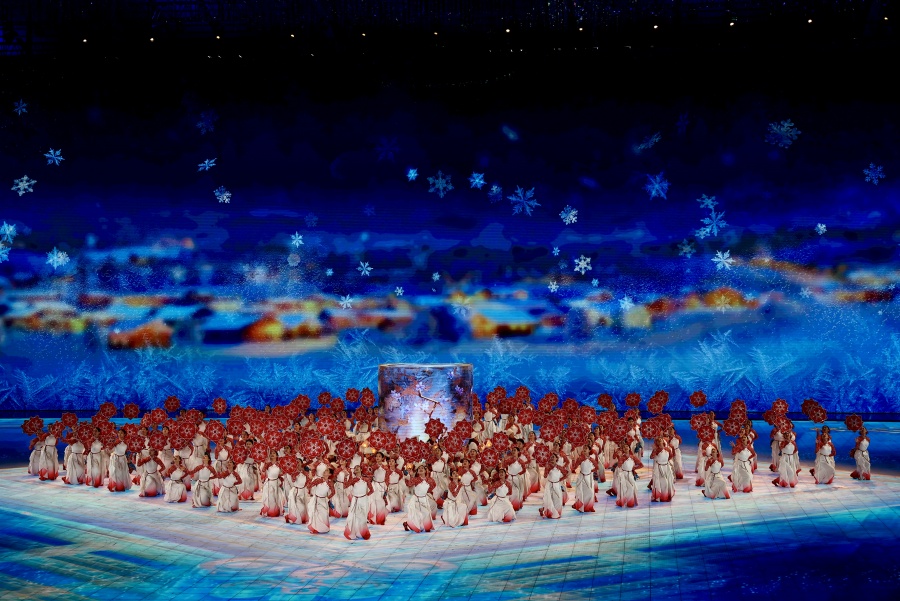

HARBIN -- The parade of athletes at the opening ceremony of the 9th Asian Winter Games in Harbin has begun on Friday evening.
Participating delegations enter the stage in alphabetical order at the Harbin International Conference, Exhibition and Sports Center.
Host China will enter the ceremony last, with star speed skater Ning Zhongyan and young freeskier Liu Mengting being the delegation's flag-bearers.
Over 1,200 athletes from 34 countries and regions across Asia will compete in the Games, making this edition the largest in terms of participating delegations and athletes.
Teams like Cambodia and Saudi Arabia are set to make their Asian Winter Games debuts. The next edition in 2029 will be staged in Trojena, Saudi Arabia, marking the first time the continental event will be staged in West Asia.
The Harbin Asian Winter Games, which serves as a valuable training opportunity for Asian countries and regions ahead of the 2026 Olympic Winter Games, will take place from Feb 7 to 14. The first gold will be decided on Saturday.







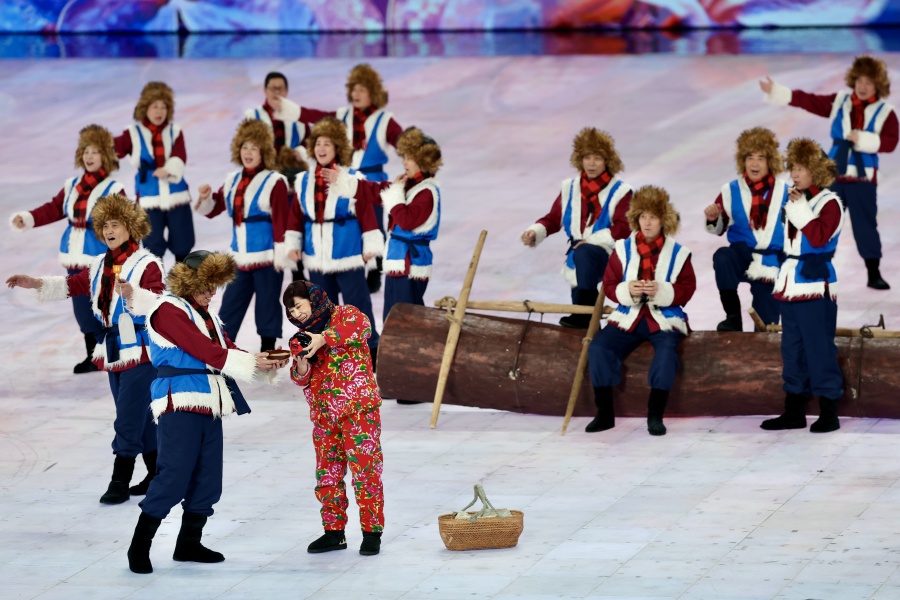
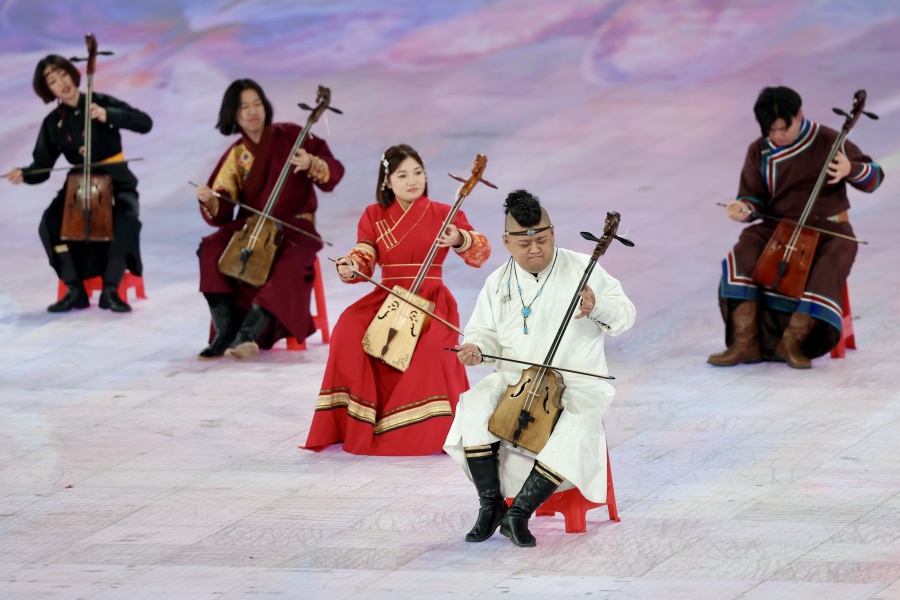
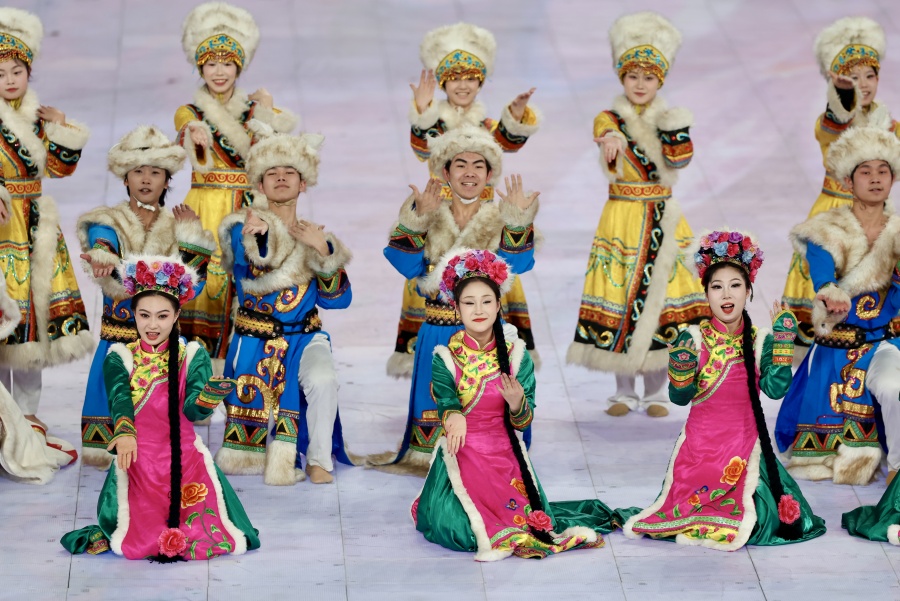
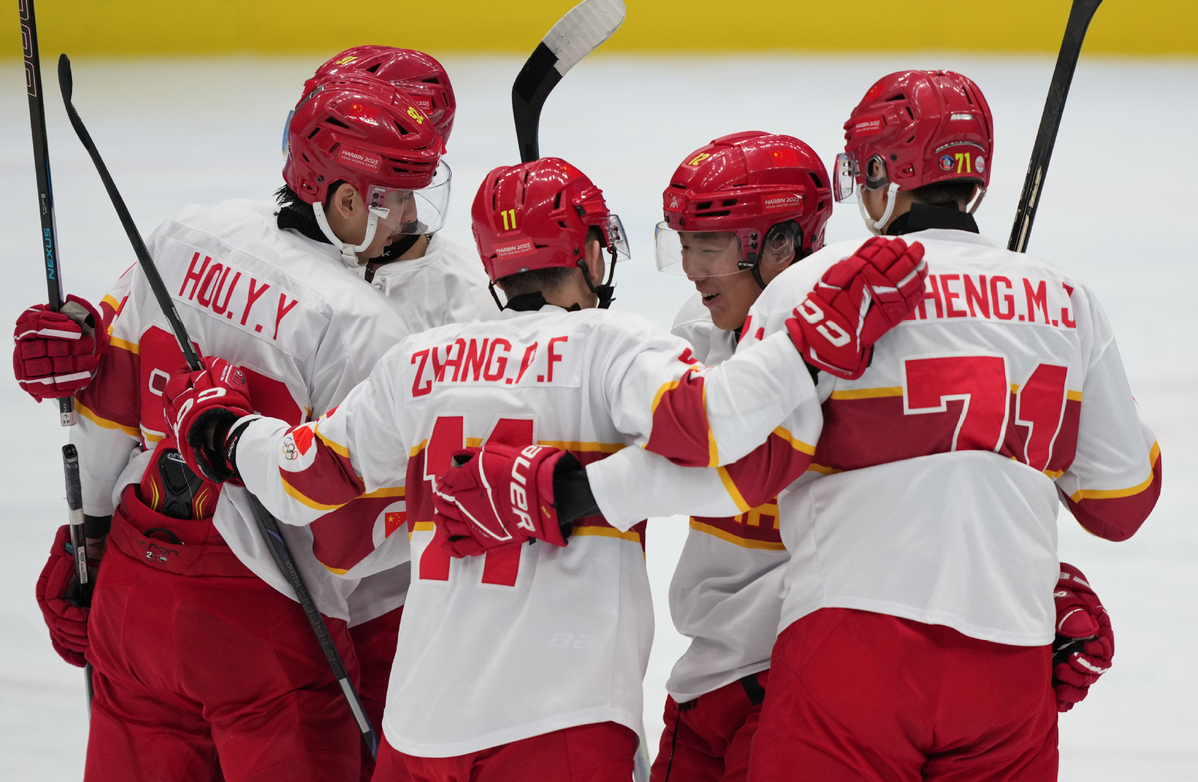
HARBIN - China dominated Thailand 8-0 to clinch their first win in the men's ice hockey Group A match at the 2025 Harbin Asian Winter Games on Friday.
After losing to South Korea and Kazakhstan in their first two games of the tournament, Chinese players played aggressively in offense, building a 3-0 lead in the first period. Zhang Pengfei, Zhang Zesen, and Wang Jing then helped the team extend the advantage to 6-0. The final period saw Wang net his second goal, while Yan Juncheng completed a hat-trick, sealing an 8-0 win for China.
In other matches on Friday, South Korea defeated Japan 5-2, while Kazakhstan crushed the Chinese Taipei 17-0.
After three rounds of competition, Kazakhstan leads Group A with an unbeaten record, followed by South Korea, Japan, and China. Thailand and the Chinese Taipei, both without a victory, rank fifth and sixth, respectively.
HARBIN -- President Xi Jinping said Friday the ice-and-snow fervor and related economy are becoming new engines of Harbin's high-quality development and new pathways of its opening up.
Xi made the remarks while addressing a welcome banquet held for international dignitaries who are here to attend the opening ceremony of the 9th Asian Winter Games.
Harbin, dubbed China's "ice city," is the birthplace of the country's modern winter sports. The city hosted the third edition of the Games in 1996.
HARBIN -- The 9th Asian Winter Games embodies Asian people's shared aspirations for peace, prosperity and friendship, President Xi Jinping said Friday, urging common commitment to realizing these goals.
Xi made the remarks at a welcome banquet ahead of the opening ceremony of the Games in Harbin, capital city of Northeast China's Heilongjiang province.
He called on Asia to hold fast to the common dream of peace and amity, jointly respond to all sorts of security challenges, and contribute to building an equal and orderly multipolar world.
Xi also stressed the shared pursuit of prosperity and development, calling on Asian people to seek common progress and inject impetus into economic globalization.
To realize the common wish of integration and affinity, Xi called for promoting inclusive coexistence, exchanges and mutual learning among different civilizations in Asia.
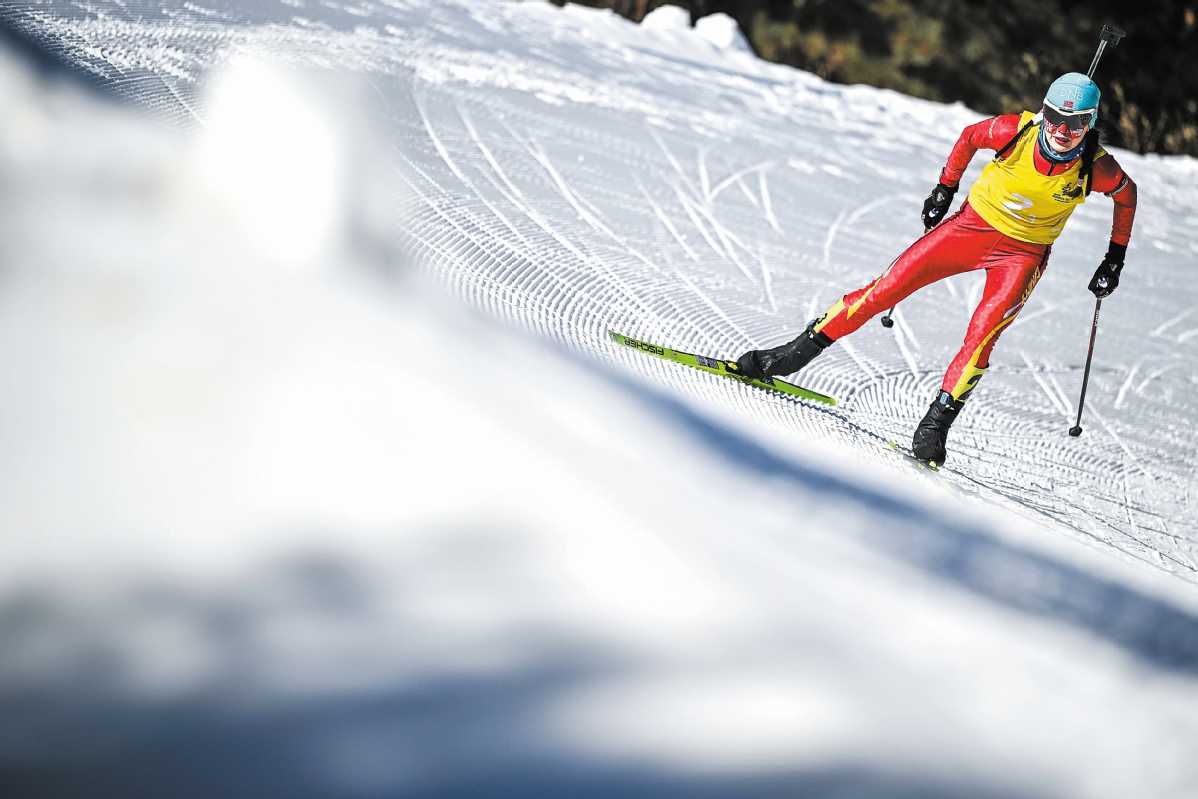
As anticipation builds for the 2025 Asian Winter Games, the Yabuli Ski Resort, 200 kilometers from downtown Harbin, is set to host the event's snow sports program, with hundreds of athletes from across Asia vying to finish on the highest step of their discipline's podium.
Scheduled to be contested between Feb 8 and 13, cross-country skiing, alpine skiing and the biathlon may not be among the most high-profile sports on the schedule, but the level of competition is incredibly high.
To prepare for the upcoming Asian Winter Games, the Yabuli Ski Resort has initiated a series of infrastructure upgrades, including a full overhaul of its ski slopes and snowmaking systems. These improvements cover key courses for alpine skiing, cross-country skiing, and other snow sports.
In January, the Yabuli Ski Resort hosted a biathlon test event for the Asian Winter Games, in which athletes from China's national team and the Heilongjiang team competed.
Jiang Yang, team leader of China's biathlon team, confirmed that the country will field a squad of 12 athletes — six men and six women — for the Asian Winter Games, with four team members having previously competed at the Beijing Winter Olympics. Veteran athlete Tang Jialin is the only member of the team who participated in the previous Asian Winter Games in Sapporo, Japan, in 2017.
China's biggest threat in the biathlon is Kazakhstan, while athletes from Japan and the Republic of Korea are also expected to challenge for medals.
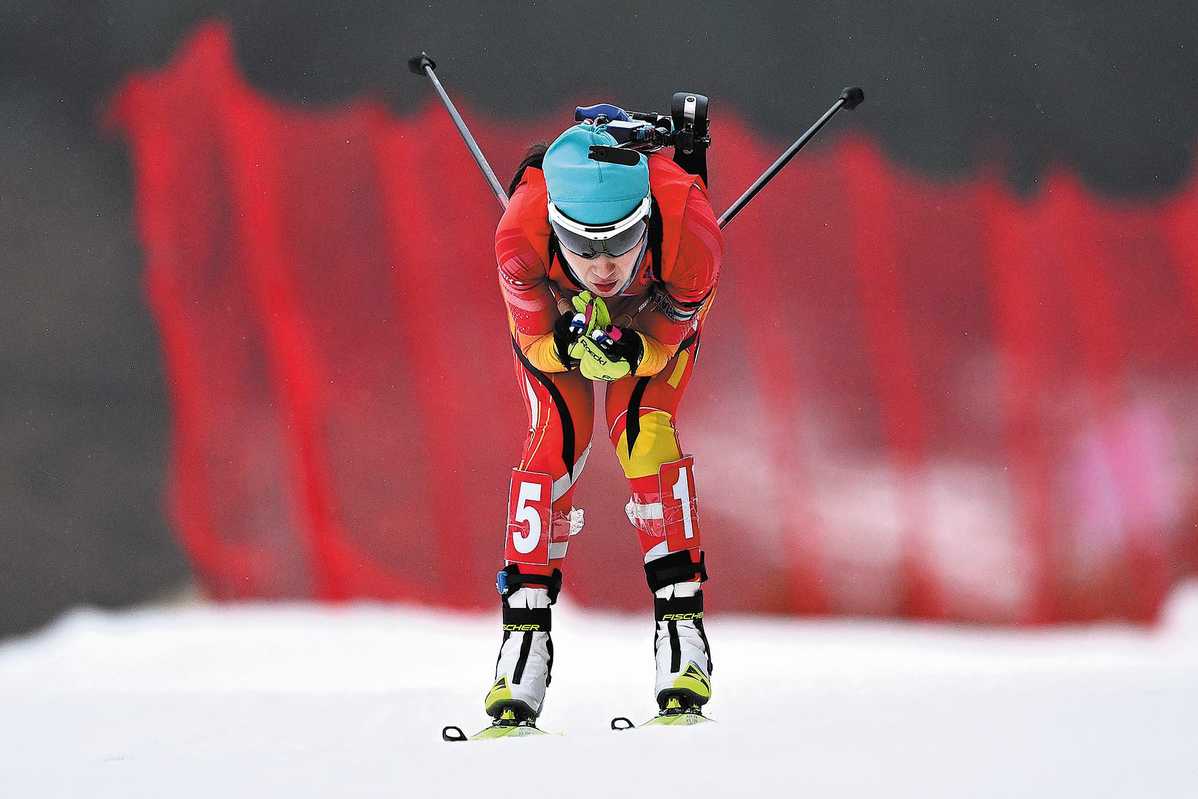
This season, 10 Chinese athletes have gained valuable international experience, competing in World Cups and the European Championship in Sweden and Norway, among others.
Many of these athletes, born in the late 1990s and early 2000s, are competing abroad for the first time, building their experience in preparation for the Asian Winter Games.
Jiang noted: "This season, our team combines veterans and younger athletes. The veterans bring a wealth of competition experience and stable shooting performance, while the younger athletes must learn from international competitions, reduce errors, and adjust to new and stricter regulations."
He also pointed out a standout performance from Meng Fanqi at a World Cup event in Finland, where she hit all four shooting targets in extreme wind conditions, ranking first out of more than 100 competitors in shooting accuracy. Additionally, 22-year-old Gu Cang secured World Cup qualification on his international debut.
According to Jiang, the national biathlon team was officially formed on July 10 last year.
Building on a foundation of scientific training and innovative development, the team has focused on enhancing both skiing speed and shooting accuracy, with personalized training plans tailored to each athlete's strengths.
Since the start of this season's international competitions, athletes have shown significant improvements in tactical execution and performance under pressure, demonstrating greater consistency in challenging weather conditions, Jiang said.
Biathlon has been a strong event for China at the Asian Winter Games, where the team has won a total of 15 golds, 19 silvers, and 16 bronzes — 50 medals in total. Jiang emphasized that the team will maintain its high morale and aim for even greater success at the upcoming Games in Harbin.
The cross-country skiing competition at the 9th Asian Winter Games will take place from Feb 8 to 12, with six gold medals up for grabs. China has previously won four golds, eight silvers, and 19 bronzes, totaling 31 medals in the history of cross-country skiing at the Games.
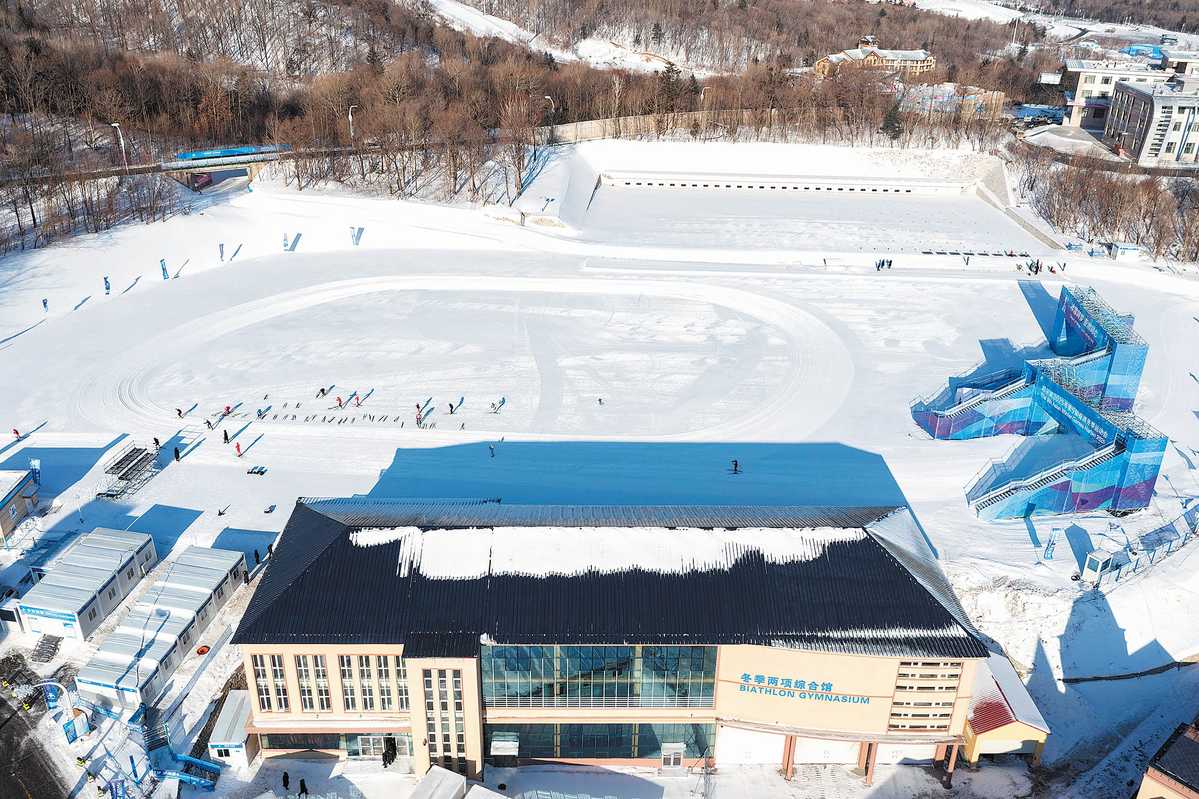
At the last Asian Winter Games, Chinese athlete Man Dandan won gold in the women's 1.4-kilometer individual sprint classical, marking China's first gold medal at that edition of the Games. This year, the Chinese team is aiming even higher.
In alpine skiing, China has yet to claim a gold, having won only two bronze medals at previous editions of the Winter Asiad. However, the team made a breakthrough at the 2022 Beijing Winter Olympics by qualifying for all alpine skiing events. As the host nation for this year's Games, China is determined to achieve better results in alpine skiing.
While this year's Games will feature stalwart teams from China, Japan, and ROK in all events, Cambodia and Saudi Arabia will compete in some for the first time.
Zhang Haihua, deputy secretary-general of the Organizing Committee of the Asian Winter Games and vice-mayor of Harbin, noted that alpine skiing has seen the highest number of registrations, with 25 countries and regions participating, including nations from South Asia, Southeast Asia, and the Middle East. Countries such as Nepal, Bhutan, India, Singapore, Malaysia, Thailand, as well as the United Arab Emirates and Kuwait, have all signed up.
"This reflects the rapid growth of winter sports in Asia, especially since the Beijing Winter Olympics," Zhang said. "With the successful hosting of this year's Asian Winter Games, we believe the reach and influence of winter sports in Asia will continue to expand, turning 'cold ice and snow' into a 'hot sport' in the region."
Contact the writer at liyingxue@chinadaily.com.cn
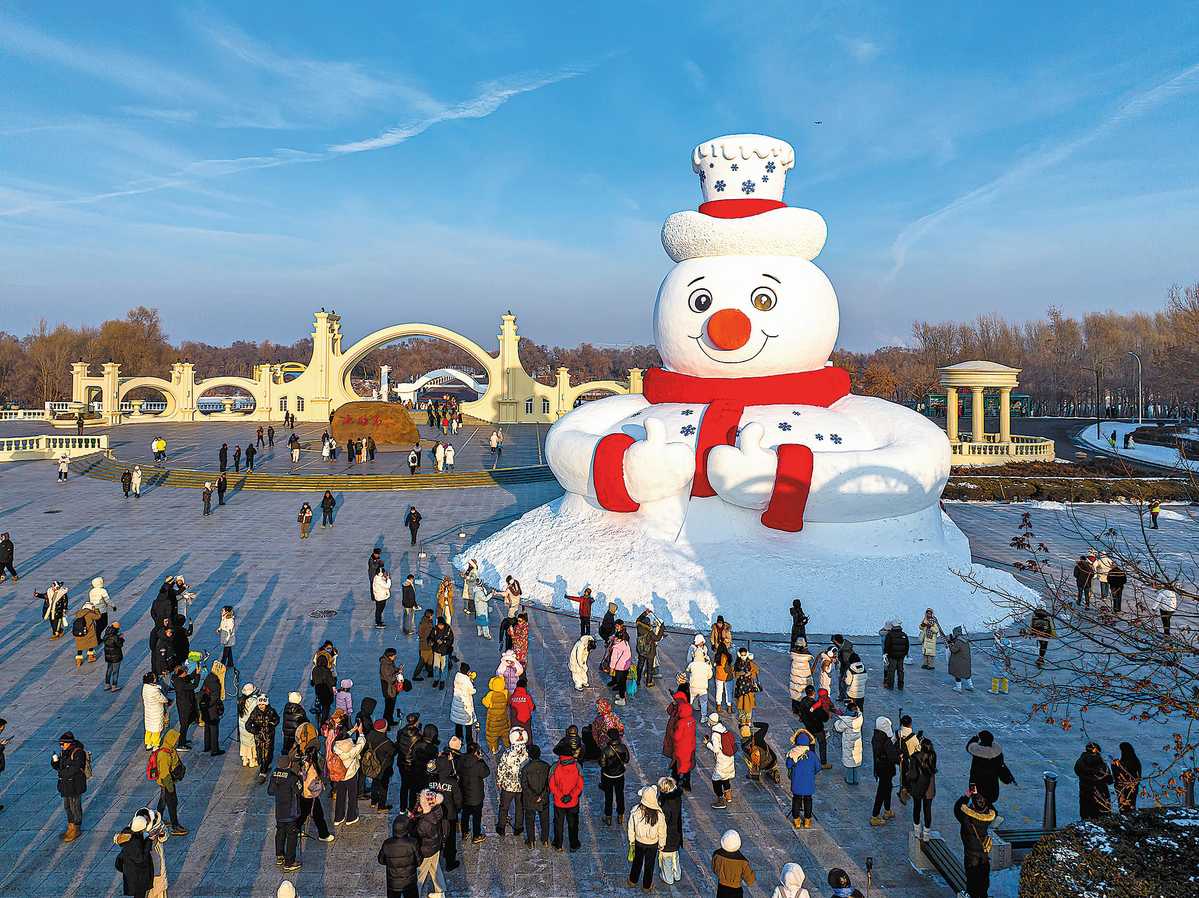
Nestled in Northeast China's Heilongjiang province, Harbin transforms into a frosty wonderland every winter, drawing visitors from around the globe. The annual Harbin Sun Island International Snow Sculpture Art Expo is the pride of the snow town.
Within an area of 1.5 million square meters, the 37th edition is presenting more than 260 snow sculptures to tourists. A total of 150,000 cubic meters of snow have been used in the construction of the magnificent attraction.
Among all the sculptures, the 100-meter-long main snow sculpture has received the most attention since its debut in late December.
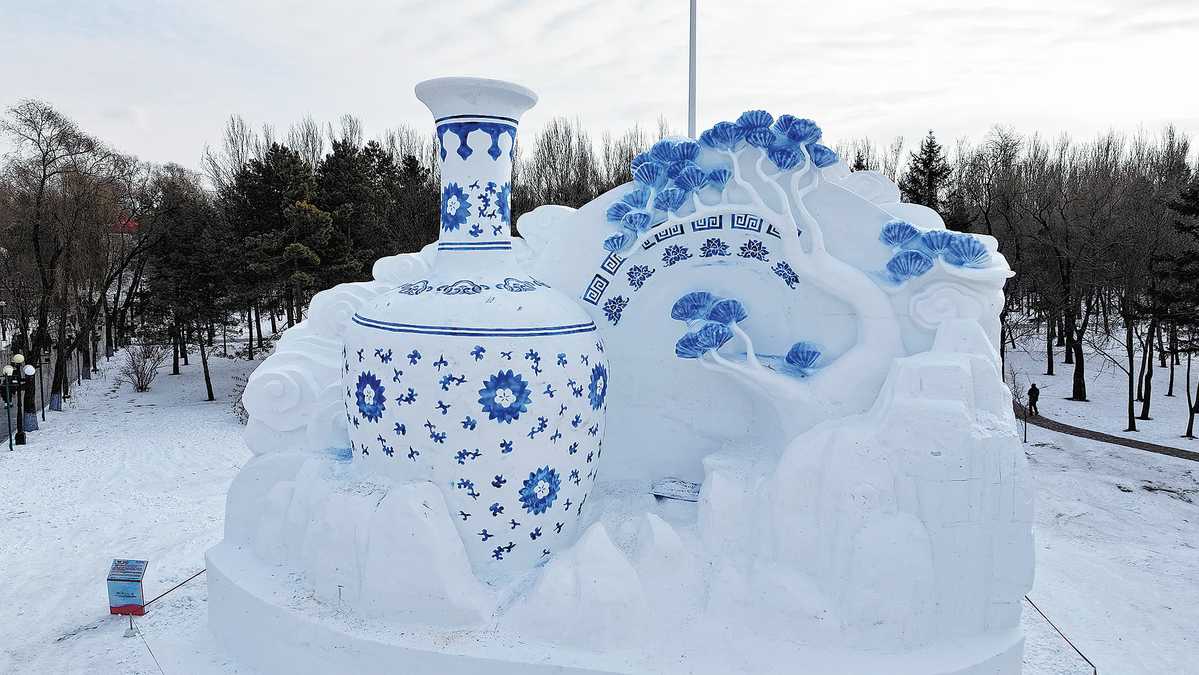
More than 80 sculptors spent eight days creating it, using 30,000 cubic meters of snow. The sculpture drew inspiration from the Chinese idiom bainiao chaofeng (hundreds of birds saluting the phoenix).
It features birds and plum blossoms as its core elements, conveying a deep longing for the beauty of spring, which aims to allow visitors to experience a unique springtime spectacle, full of harmony, hope and emotional richness within the icy winter landscape of the expo.
Another signature sculpture is a 20-meter-tall snowman, which embodies the warmth and generosity of the people of Harbin. It has a bright red scarf with a red carrot-shaped nose. With thumbs raised in a gesture of greeting, the snowman smiles to welcome visitors and locals alike.
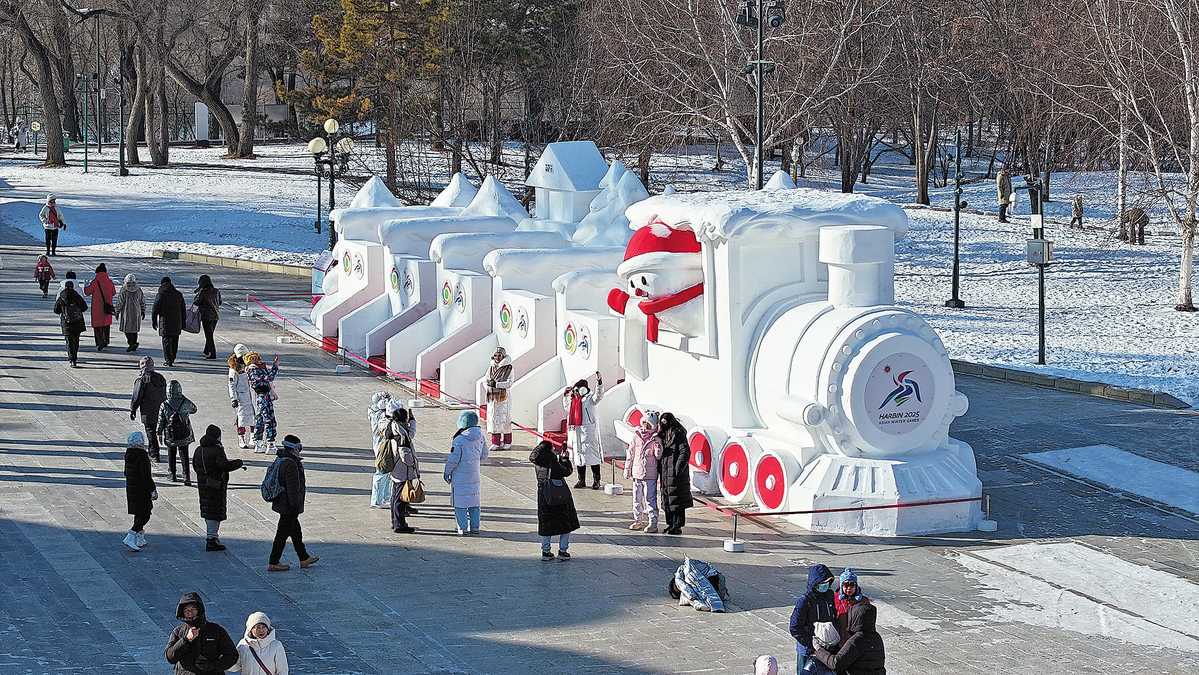
Another is the Return of the Monkey King, standing about 20 meters tall and formed of approximately 2,400 cubic meters of snow.
Based on the classic image of the Monkey King, the sculpture is meticulously carved to showcase a resolute and powerful figure. Every detail, carefully crafted by sculptors, conveys Sun Wukong's unwavering spirit and determination, evoking a sense of awe and admiration.
Through clever lighting and three-dimensional presentation, a magnificent and awe-inspiring atmosphere is created, as if the hero is about to leap out of the snow to vanquish demons.
Amid a sea of white sculptures, a qinghua (patterns in cobalt blue on a white background) porcelain snow sculpture, painted with vibrant colors, adds a unique touch to the park and is a popular spot for tourists to take photos.
The 14-meter-high sculpture employs a unique coloring technique to capture the elegance and purity of traditional blue and white porcelain, presenting its graceful and natural lines.
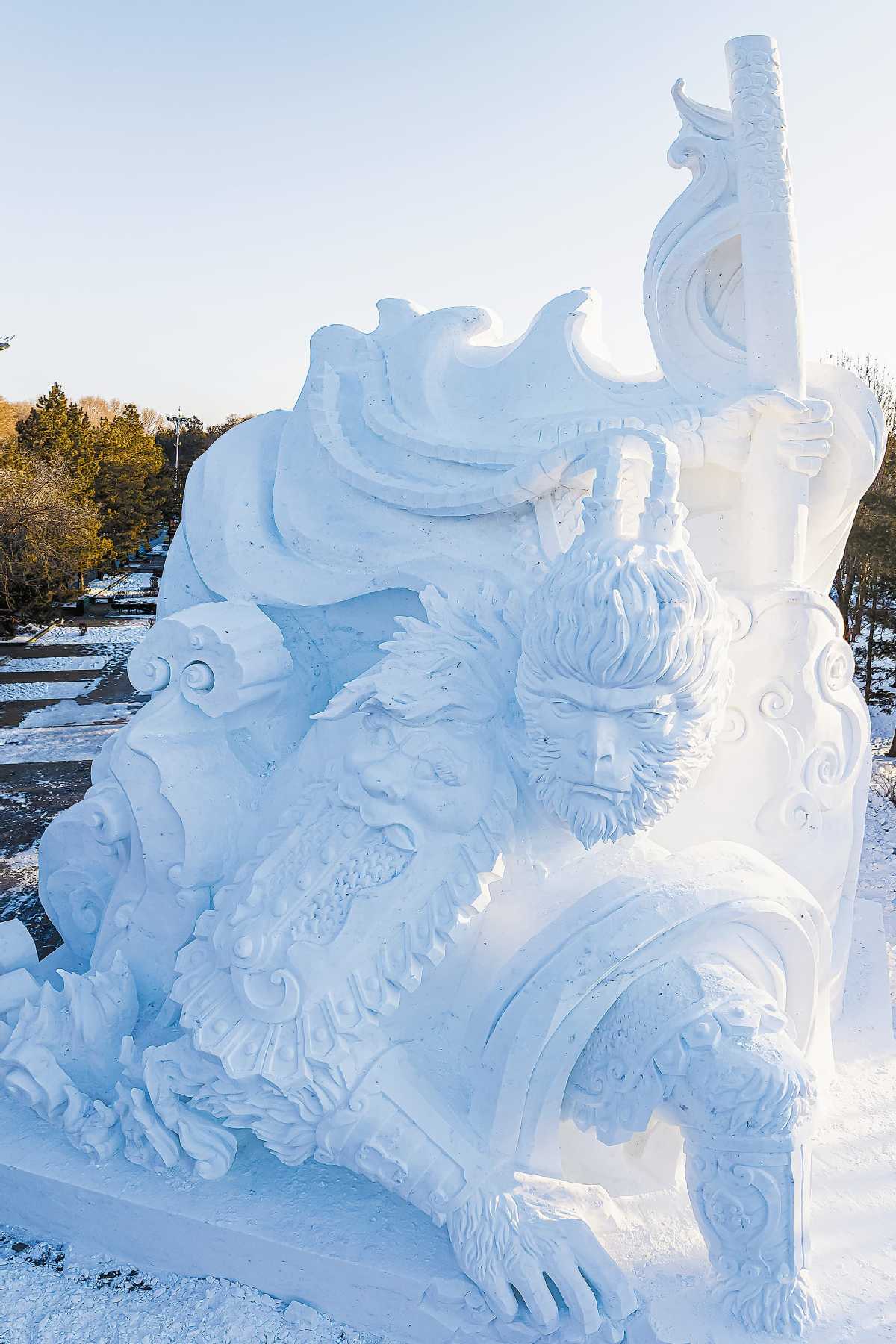
To celebrate the 9th Asian Winter Games, sculptors created the Legendary Sacred Flame, which is adorned with a touch of red, adding a vibrant splash of color. It symbolizes light, hope, unity and the spirit of the games, showcasing the city's unique charm.
With its exquisite design and attention to detail, it conveys a deep love for winter sports and a yearning for peace. It not only pays tribute to the Games, but also serves as a fantastic opportunity to showcase Harbin's ice and snow culture to the world, welcoming visitors to experience the city's hospitality, vibrancy, and leave with fond memories of the Games.
During the expo, which runs until the end of February, organizers have also planned a series of innovative snow-related events in addition to the traditional snow carving competitions.
For example, one unique event — the parent-child snow carving activity — aims to enhance family cohesion.
Contact the writers at zhouhuiying@chinadaily.com.cn
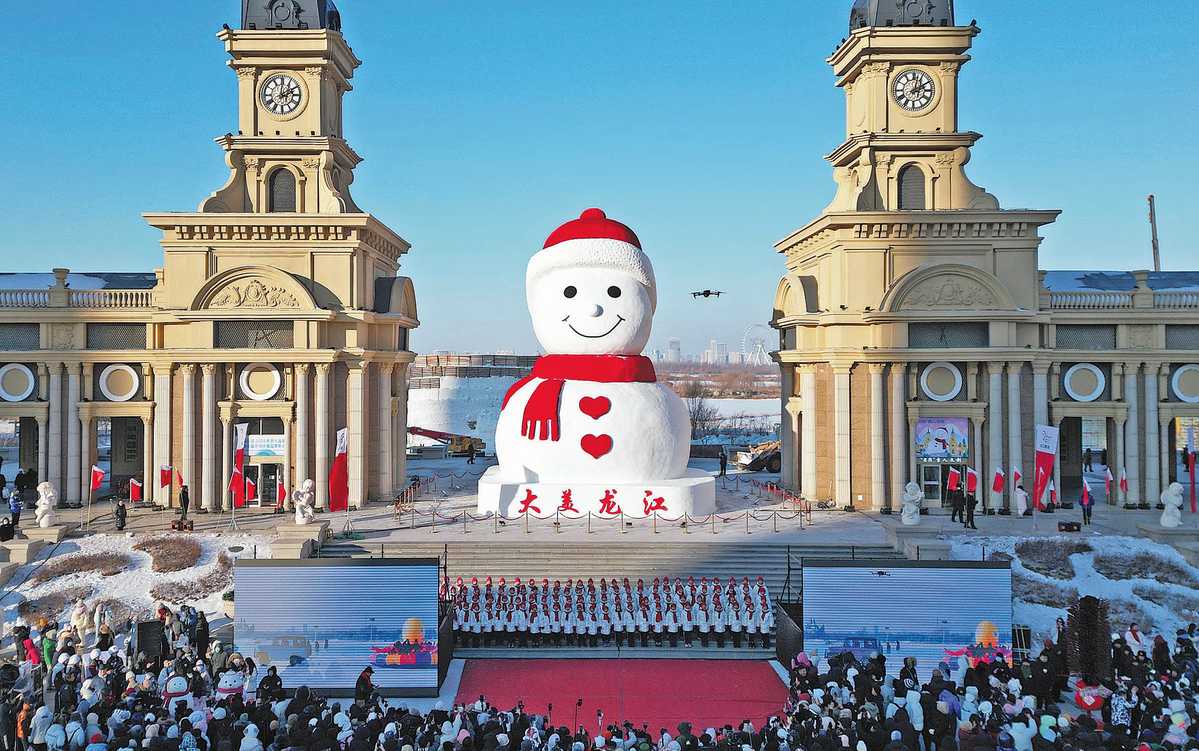
During the winter season, various big snowmen scattered throughout Harbin, capital city of Heilongjiang province, have gained a reputation from tourists at home and abroad.
From the classic figure at the Music Square and the family of snowmen at the 26th Harbin Ice and Snow World, to the giant snowman standing at the bank of the Songhua River and the diverse snowmen at Yanjiagang Farm, the people of Harbin have infused the lovable characters with even more imagination and innovation.
The Harbin Ice and Snow World has meticulously crafted a set of giant snow sculptures, called the Snowman Family, in front of its ticket sales hall, warmly welcoming visitors from all directions.
The towering snow father, the gentle snow mother and the adorable snow baby, cuddle each other with great affection.
The round bodies, round eyes and cute expressions make them seem incredibly endearing.
Their giant hats and scarves are made of specially customized materials, and they have been dressed in different styles according to different holiday periods.
In the Beidahuang Yanjiagang Ice and Snow Wonderland, two giant snowmen, and an assembled 800 smaller figures, have formed a "Snowman Legion".
The two giant snowmen — Jiabao and Yanbao — were created to incorporate elements of the Year of the Snake.
Standing at around 16 meters tall, they are wear snake-themed hats on their heads, have red noses, pink cheeks, bright eyes and are vividly lifelike.
The 800 snowmen have been divided into 10 formations.
Every snowman is 1.6 meters tall, with a maximum diameter of 1.5 meters.
They all have subtle differences — some have round noses, while others have pointed ones.
Visitors can even adopt them, naming the snowmen, determining their birthdays and leaving them messages. Each adopted snowman is given a unique nameplate that is maintained by the staff.
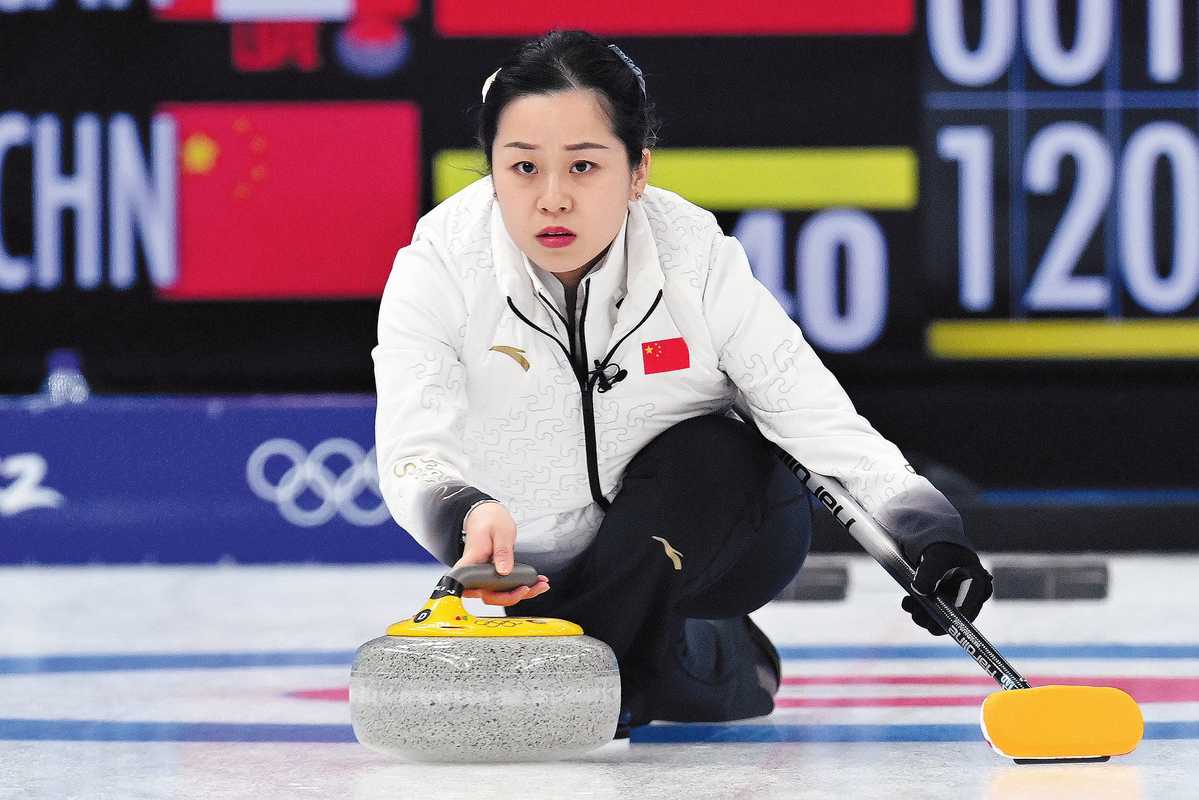
As the host of the upcoming 9th Asian Winter Games, China will be sending a delegation of over 170 winter sports athletes. The first event for the Chinese team was the mixed doubles curling, with a round-robin match on the morning of Feb 4, in which Chinese curlers Han Yu and Wang Zhiyu flew the nation's flag high with a comprehensive 11-5 win over Kazakhstan. The duo followed that up with victories over Kyrgyzstan, the Philippines and the Republic of Korea, putting them in medal contention already.
The curling competition is being held at the Harbin Pingfang District Curling Arena and features three disciplines: men's curling, women's curling, and mixed doubles curling, with the latter making its debut at the continental winter sports gala.
At the 8th Asian Winter Games in Sapporo, Japan, in 2017, the Chinese men's and women's curling teams clinched victories over the teams from Japan and the ROK, respectively, to secure their first-ever Asian Winter Games curling titles.
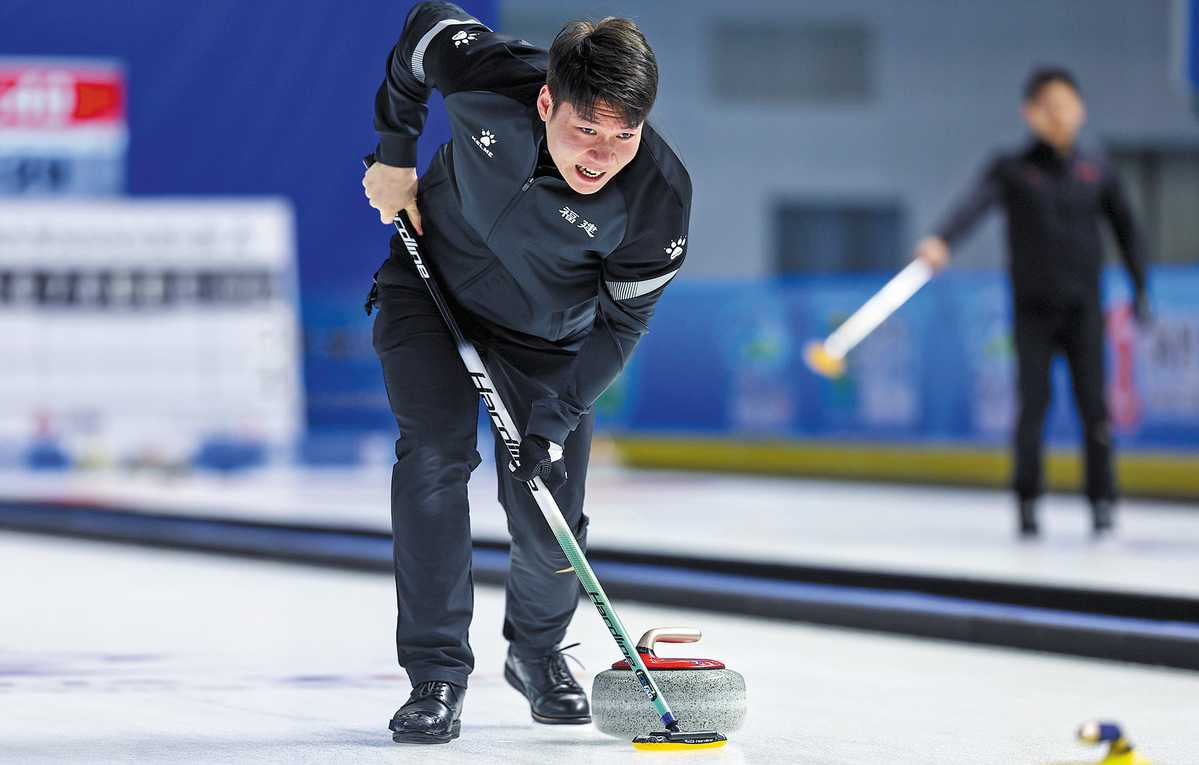
Among the 10 curlers in the Chinese delegation to Harbin, only female curler Wang Rui and male curler Xu Xiaoming remain from Sapporo's gold medal-winning teams.
The first puck also dropped in the ice hockey competition on Feb 4. The Chinese men got off to a rocky start, falling narrowly to the ROK 6-5 in the first round and getting thumped 6-1 by Kazakhstan in its second game at the Harbin Ice Hockey Stadium.
The 3,000-seat arena will be full again Friday, as the men go in search of a morale-boosting win against Thailand in what will be a do-or-die match if the host hopes to advance further in the competition, with tests against Chinese Taipei and Japan looming large.
Led by captain Yu Baiwei, a Harbin native, the Chinese women's ice hockey team is currently ranked 12th in the world. In the final of the 2025 IIHF Ice Hockey Women's Asia Championship held in Beijing on Nov 3, China was defeated by Japan. The battle for the gold medal at this Asian Winter Games may be a replay of that intense encounter.
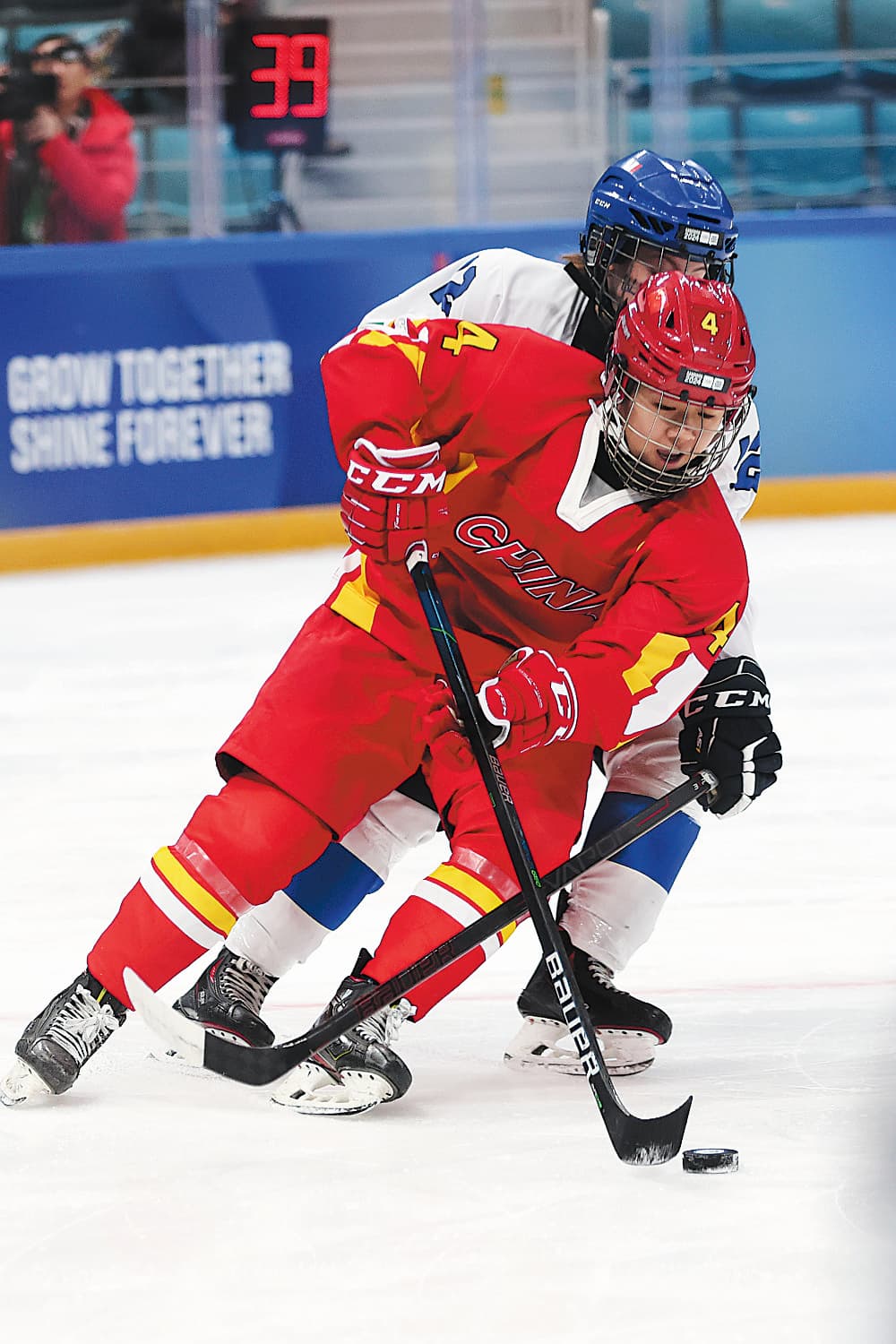
The puck drops in the women's campaign on Feb 12, with their first opponent in Group A yet to be decided.
Speed skating, which has been a sport at the Asian Winter Games since the first edition in 1986, will award the most gold medals in Harbin, with 14 in total.
A gold medalist in the men's 500m at the 2017 Sapporo Asian Winter Games and the Beijing 2022 Winter Olympics, Chinese speed skater Gao Tingyu has returned from an extended break due to injury and is targeting a successful title defense in Harbin.
Aged 27, Gao has long been the sole contender from the Chinese speed skating team vying for medals on the international stage. However, the situation has begun to change.
Since last season, China's skating team, led by younger athletes like Ning Zhongyan and Han Mei, has gradually improved, with their performances in international competitions steadily on the rise.
For example, during the 2024-25 ISU Speed Skating World Cup event in Nagano, Japan, Han secured the silver medal in the women's 1,500 meters with a time of 1:55.18, while Ning claimed the bronze in the men's 1,500 meters with a time of 1:44.69.
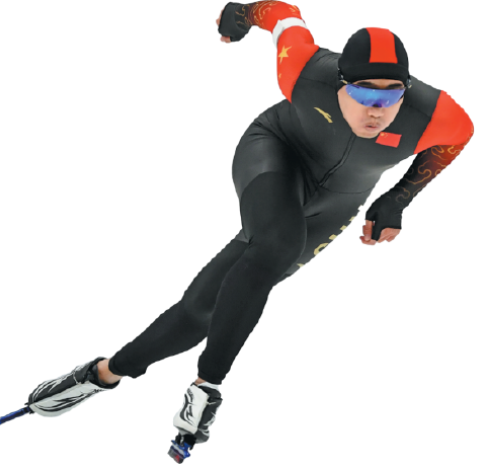
A month later, on the second weekend of the competition, held at the National Speed Skating Oval in Beijing, the Chinese team ultimately secured one silver and three bronze medals.
Gao acknowledged that younger speed skaters are emerging, alleviating a lot of the pressure on his shoulders.
"It doesn't feel like I'm fighting alone, as it did before. Chinese speed skating is getting better and better," Gao remarked.
At the 2022 Beijing Winter Olympics, Ning, as an Olympic debutant, finished seventh in the men's 1,500 meters and fifth in the 1,000 meters. Having endured the challenges of the Olympics, Ning stated that his biggest takeaway from the Games was a more stable mindset.
With podium finishes becoming the norm over the past couple of years, Ning has learned to keep these achievements in perspective. "Frequently being on the podium might not be a good thing (in terms of becoming complacent). I hope to continue maturing and growing," Ning said.
Contact the writer at xingwen@chinadaily.com.cn
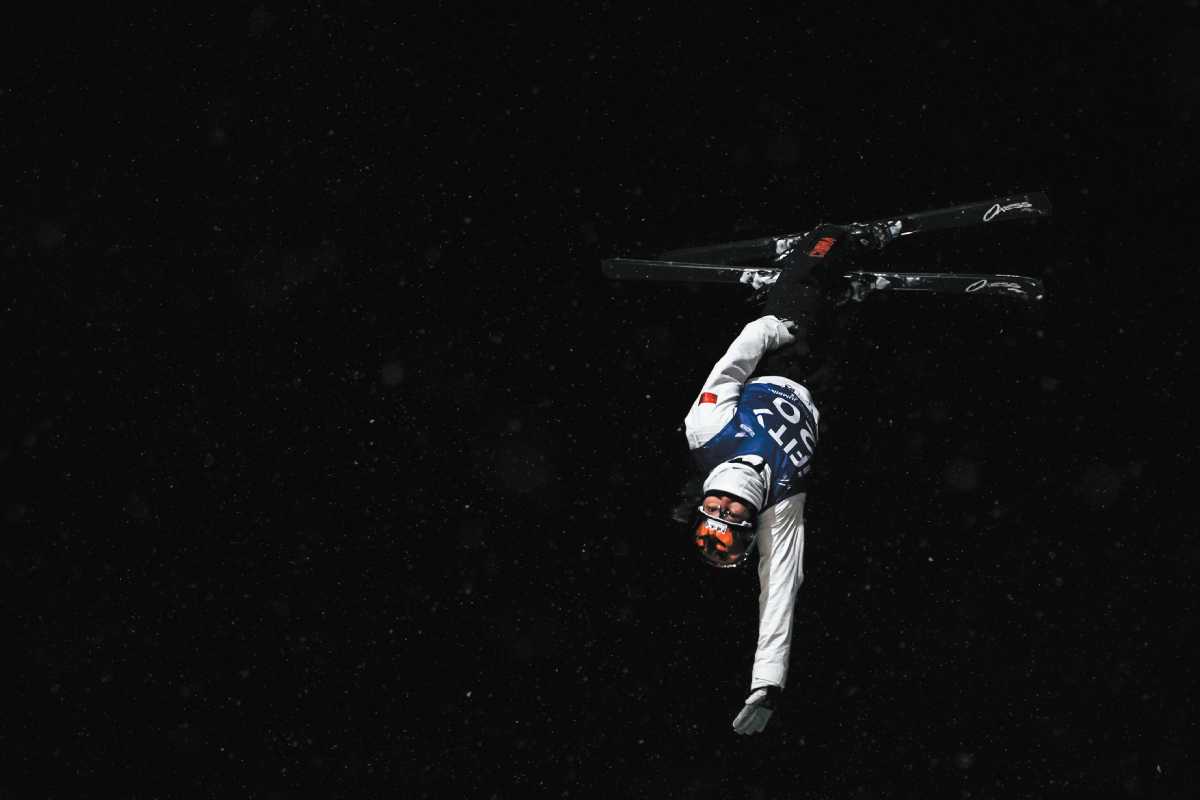
The latest addition to the Olympic winter sports program — ski mountaineering — is expected to scale new heights of popularity, piquing the interest of fans in Harbin, with its Winter Asiad inclusion serving as a dress rehearsal for its much-anticipated Olympic debut.
Despite being the smallest among all six snow sports in terms of medals up for grabs on the program at Harbin 2025, ski mountaineering is drawing increasing attention at the 9th Asian Winter Games as participating athletes, fans and sports officials all look forward to its critical test run ahead of the 2026 Winter Olympics in Italy.
Harbin 2025 features exactly the same events as those that will be on the program of Milano-Cortina — men's and women's sprints, and a mixed relay combining two sprint races, with three gold medals up for grabs in total.
An endurance sport originating from transportation across snow-covered regions, ski mountaineering — known as skimo — combines ascents and descents over alpine terrain with long, rugged uphill sections that require athletes to climb, challenging skiers more physically than its counterpart cross-country event.
Traditionally only popular in the European Alps, the growth of skimo in North America and China has helped the sport gain more international exposure, prompting the International Olympic Committee to decide in 2021 to add it to the official program for next year's Winter Games.
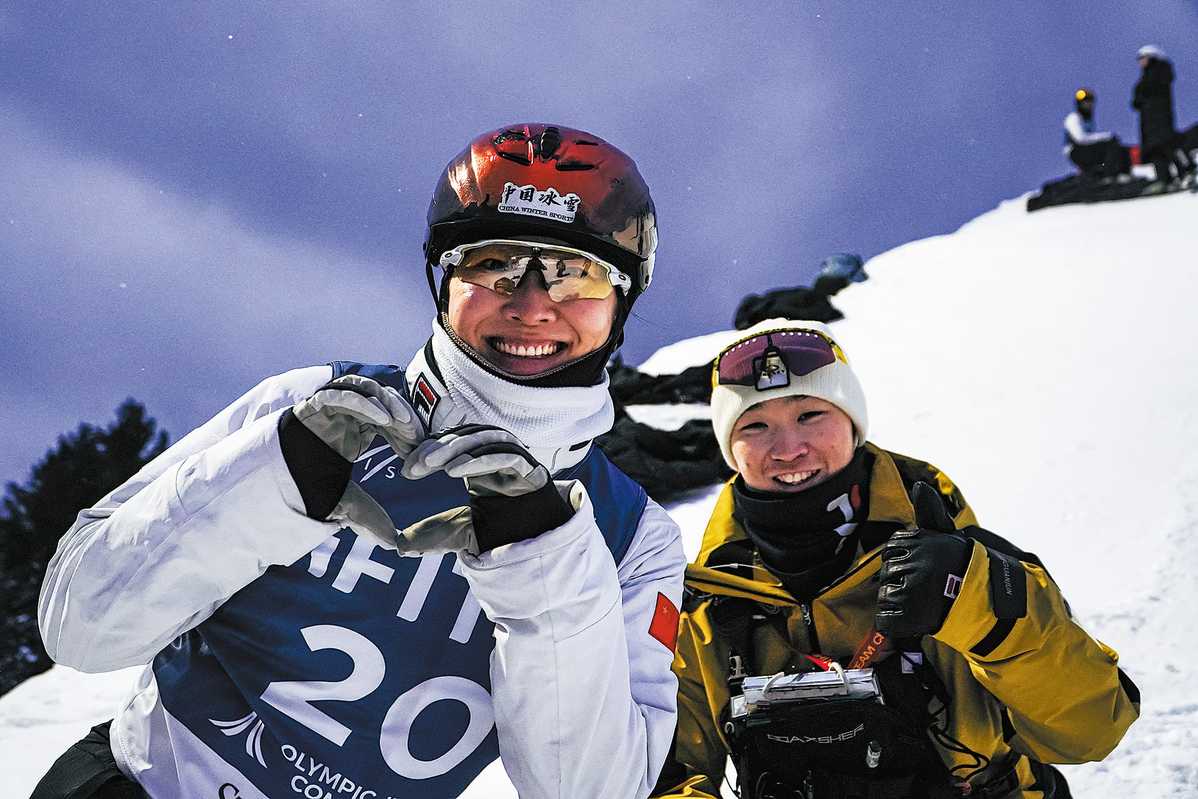
The Olympic Council of Asia followed suit in 2023 to include it in the program for Harbin 2025, a move welcomed by the International Ski Mountaineering Federation (ISMF), which has been dedicated to promoting the sport's profile using the exposure of major multisport events since it was officially recognized by the IOC in 2016.
Held at the Yabuli Ski Resort, which is about 200 kilometers from downtown Harbin, the skimo program at the Winter Asiad kicks off with the quarterfinal rounds in the individual sprint, beginning at 10:30 am on Feb 9, followed by semis and finals on the same day, before the mixed relay caps off its Asiad debut three days later.
The sprint discipline involves athletes racing in three phases: skiing uphill from the start, climbing with skis attached to their back for a steep ascent, usually 70 meters above the start line, before switching back to skiing and racing down a giant slalom-like course to the finish line — all in under four minutes.
Since it was established in 2022, China's ski mountaineering national team has collected an impressive medal haul from international events, achieved mainly by athletes selected from the high-altitude areas in Xizang and the Xinjiang Uygur autonomous regions.
The strong results include 22 gold, three silver and seven bronze medals in multiple disciplines, such as individual, sprint and vertical, from seven ISMF World Cup events, four Youth World Cup legs, and the 2023 World Championships.
The young and ambitious Chinese team has completed a two-month training and competition program in Europe. It returns to home snow in full confidence and ready to prove its continental dominance in the tactical test of speed and endurance.
With 10 national associations from Asia having joined the ISMF, including provisional members, skimo is expanding to new territories, however, none seem quite strong enough yet to threaten the host's medal ambitions.
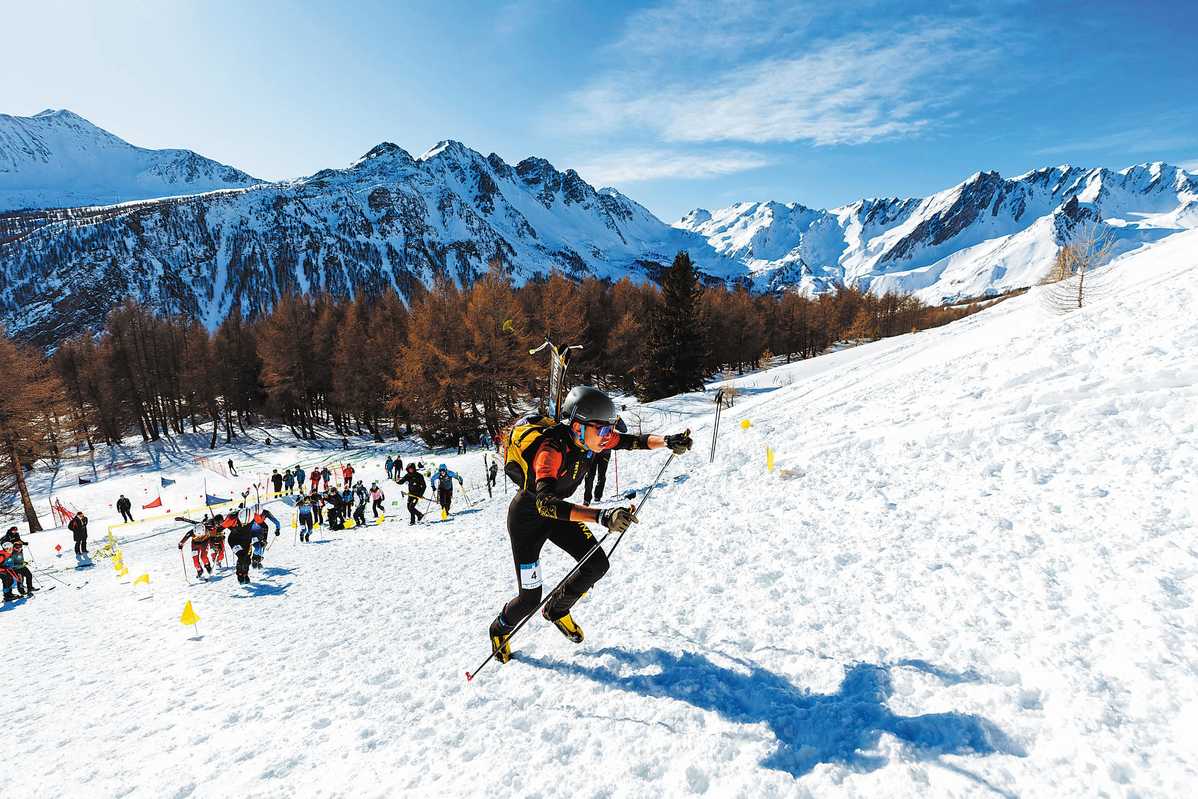
Synchro delights
The Yabuli cluster will also provide fans with another fresh take on the beauty of snow sports with freestyle skiing aerials to feature a new synchronized format.
The synchro discipline involves male or female pairs taking off simultaneously from two relatively lower-than-normal jumps to perform flips and spins at the same pace, with the synchronization of their tricks heavily judged in the scoring of their runs.
The inclusion of the new format in Harbin, as well as on the FIS 2024-25 World Cup circuit, is expected to help push it into contention for future Winter Olympics inclusion.
The host squad, led by reigning Olympic individual champions Xu Mengtao and Qi Guangpu, will face a serious challenge in Yabuli from fierce international rival Kazakhstan, another powerhouse in the sport that will possibly feature men's European Cup winner Sherzod Khashyrbayev, reigning world junior champion Dinmukhammed Raimkulov, and women's European Cup bronze medalist Ayana Zholdas.
Mixing it up
In Harbin, on the rink, mixed doubles curling will make its long-overdue debut at the Asian showpiece after having been contested at the Winter Olympics twice at Pyeongchang 2018 and Beijing 2022.
With only two players involved and shorter frame of competitions, mixed doubles curling, which is somewhat more unpredictable than the four-player team event, opens up greater opportunities for underdogs to upset the heavyweights.
The mixed discipline, which already kicked off its round-robin play on Tuesday with the final scheduled right after the opening ceremony on Saturday, has guaranteed an intriguing contest of tactics and precision as the host team, Japan, the Republic of Korea and Chinese Taipei, among many others, look to slide their way to continental glory.
Contact the writer at sunxiaochen@chinadaily.com.cn
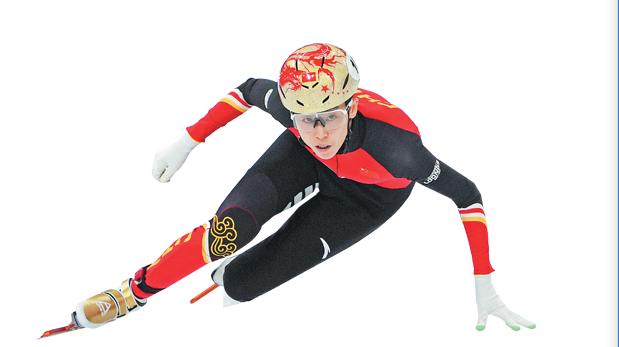
With a dramatic clash between the Chinese Loongs and the Korean White Tigers drawing global attention, the short-track speed skating program at Harbin 2025 is guaranteed to be a world-class showcase of the sport at its highest level.
Forget about the much anticipated opening ceremony, at least for now, as the hair-raising, heart-pumping hot pursuit at the Heilongjiang Ice Training Center — where Friday morning's preliminary rounds of short-track speed skating are being held — has already stolen the limelight at the continental gala event.
As arguably the world's most decorated national program in short-track, the Republic of Korea, known as the White Tigers on the rebranded ISU World Tour, is on the prowl to capture as many of the nine gold medals up for grabs in Harbin as it can when the shorttrack final sessions take place this weekend.
"We are looking at winning six gold medals or more," head coach Yoon Jae-myung told reporters before the team arrived in Harbin on Sunday. "Our athletes are in decent form, and we'll do our best to accomplish our goal."
On Saturday morning, the first gold medal of Harbin 2025 is expected to be awarded in the short-track speed skating 2,000m mixed relay, followed by the finals of the men's and women's 1,500m and 500m races. Sunday will cap off the tightly scheduled shorttrack program in Harbin with two more individual finals in 1,000m, and the women's 3,000m and men's 5,000m relays.
The ROK women's team features three-time Olympic champion Choi Min-jeong, who took a leave of absence last season but has come back strong. She's joined by Kim Gil-li, last season's ISU World Cup overall champion and Shim Sukhee, who has won two Olympic gold medals.
Two-time ISU World Cup overall title winner Park Ji-won will lead the men's squad, joined by Jang Sung-woo and Kim Gun-woo. A two-time Olympic gold medalist, Lee Jung-su, the team's elder statesman at 35, will be competing in the relay.
"The 2,000m mixed relay will be the first final, and we want to get off to a good start there," Choi said. "Since the Games are in China, we expect some tough competition against Chinese skaters. We will try to avoid collisions with them and stay on our feet to win gold medals."
After completing the first four stops on the 2024-25 Short-Track World Tour, the Chinese squad, dubbed the Loongs by fans on the circuit, has recovered physically and mentally from the demanding ISU races, and is primed to help get the host delegation off to a scintillating start in Harbin, despite the fierce challenge posed by the Koreans.
Team China, coached by Zhang Jing, will lean on its roster's blend of youth and experience — bolstered by men's Olympic gold medalists Liu Shaoang and Lin Xiaojun, and women's veteran Fan Kexin — to deliver its best Asian Winter Games performance on home ice.
Star skater Lin, who was born in ROK but chose to represent China in 2019 as a naturalized athlete, said he cannot wait to go for gold on his Asian Winter Games debut.
"The Asian Winter Games are the only competition where I don't have a medal," Lin, the men's 1,500m gold medalist at the 2018 Winter Olympics, told CGTN in Korean.
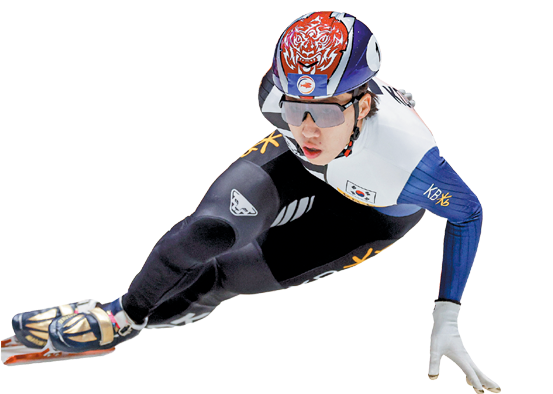
"The event I'm most excited about is actually the team event. My biggest ambitions are winning gold medals in the men's 5,000m relay and mixed 2,000m relay.
"For the past year, the athletes have worked hard through sweat and tears in preparation for these events. The men's 5,000m relay is the last event in short-track speed skating, so that's the one I'm most focused on," Lin said.
Aiming to spoil the party of the East Asian powers will be emerging short-track contender Kazakhstan, a team that boasts world championships silver medalist Denis Nikisha in the men's 500m alongside a group of talented teen skaters.
The Kazakh short-track team had five days of training at the Heilongjiang Ice Training Center before the prelims kicked off, and is confident that the team's solid pre-Games camp will deliver breakthrough results, said head coach Petr Gamidov.
"The rink is very good, and the ice is of high quality and fast. I think the athletes will achieve good results," he told Xinhua. "Our goals are, of course, medals, and we hope the athletes will have an intense and fair competition," Gamidov added.
Also setting golden ambitions at the Heilongjiang Ice Training Center is the Japanese figure skating team, widely considered a hot favorite for both the men's and women's events in the most aesthetic ice sport, which begins its three-day program on Feb 11 at the same arena, following the completion of the short-track racing events.
Japan's mighty figure skating squad stars three-time women's world champion Kaori Sakamoto and two-time men's Olympic silver medalist Yuma Kagiyama.
sunxiaochen@chinadaily.com.cn
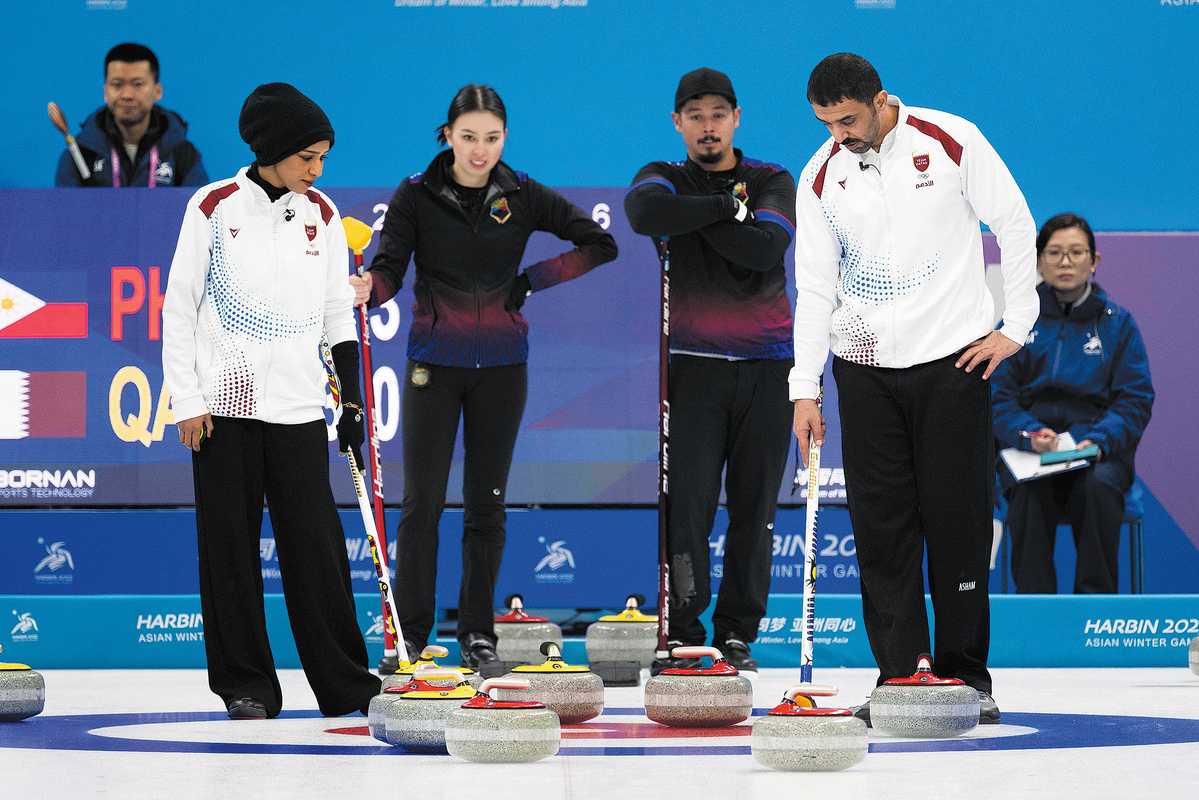
Small, perhaps, in numbers, but huge in ambition — some emerging delegations from Asia's hottest and driest regions are raring to make their presence felt on the ice and snow of Harbin.
Like the Philippines, which just won a mixed doubles round-robin match against the Republic of Korea. Few, if any, would've picked debutants Kathleen Dubberstein and Marc Pfister over the top-ranked Korean duo of 2018 Olympic silver medalist Kim Kyung-ae and teammate Seong Ji-hoon.
Dubberstein and Pfister, however, proved even the most sophisticated pundits wrong on Tuesday, by upsetting the title favorites 12-6 on Day 1 of the Asian Winter Games' curling tournament, kicking off a three-win streak in Group B, until their first loss to host China on Wednesday.
The round-robin stages of the ice hockey and curling tournament got underway on Monday and Tuesday, respectively, days ahead of the Games' official opening on Friday, due to their lengthy competition schedules.
Representing a national program that was only established in 2023, the Filipino duo took pride in turning heads in Harbin, while mincing no words about their ambitions.
"If we can get a medal for the Philippines, that would be great," said Dubberstein, who will lead the Filipino delegation into the opening ceremony as its flagbearer, alongside short-track speed skater Peter Groseclose.
"But, we are a new team, so we will work on our team dynamics and shot-making to improve our performance."
Like many tropical nations, the Philippines is embracing ice-based sports, particularly curling, in a bid to establish itself in winter sports. Half of the country's 20 athletes in Harbin are curlers.
"We are definitely the underdog team here, but our athletes are here to compete and they are proud to represent the country," Curling Pilipinas secretary-general Jarryd Bello told the Philippine Daily Inquirer.
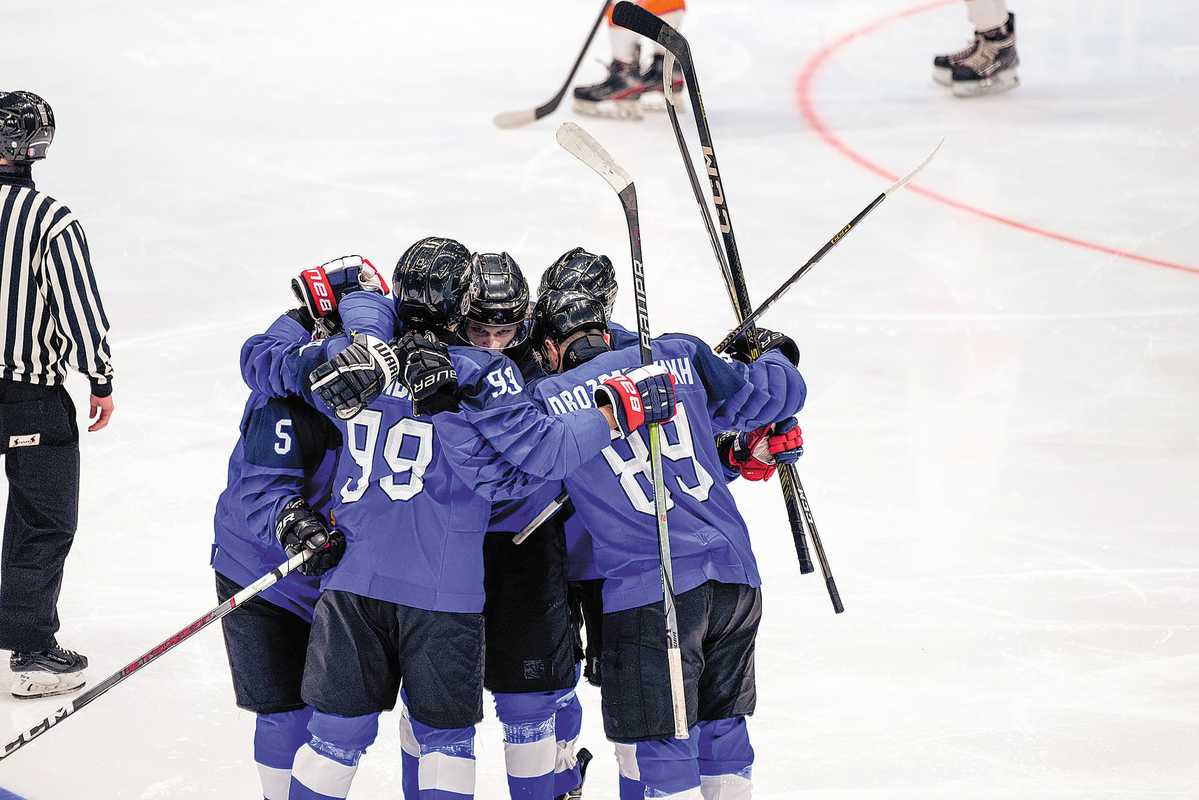
Newcomers welcomed
Now, with more countries and regions from Southeast and West Asia joining in, the Harbin edition of the Winter Asiad, which features a record number of 34 participating delegations, has borne witness to the expansion of winter sports in Asia.
Cambodia and Saudi Arabia are both making their Games debut in Harbin, while over 10 countries and regions from Asia's usually snowless areas, including Thailand and Kuwait, have sent their largest delegations to compete in a wider range of sports than they did at previous editions.
Thailand, a continental power in summer events such as soccer, badminton and golf, is committed to promoting winter sports as well, in a bid to help diversify its leisure and tourism sector, said Yuthaya Cheenheet, director of the elite sports development department of the Sports Authority of Thailand.
"We are a hot country, we don't have snow, and we don't have a winter sports training center yet, but we need to develop our winter sports to try and catch up with international standards," Cheenheet told Winter Asiad at Beijing's Capital International Airport on Wednesday, before boarding his flight to Harbin.
"We do have an ice rink at a shopping mall, and we sent our athletes to train in Korea to prepare for the Asian Winter Games.
"I totally agree that it's a good move to expand winter sports, particularly ice events at indoor facilities, to some tropical countries as well, because it's helpful for developing an economy around sports and tourism," he added.
A record number of 87 Thai athletes have signed up to compete in six sports at Harbin 2025, with some to make surprising appearances in altitude events such as ski mountaineering and alpine skiing.
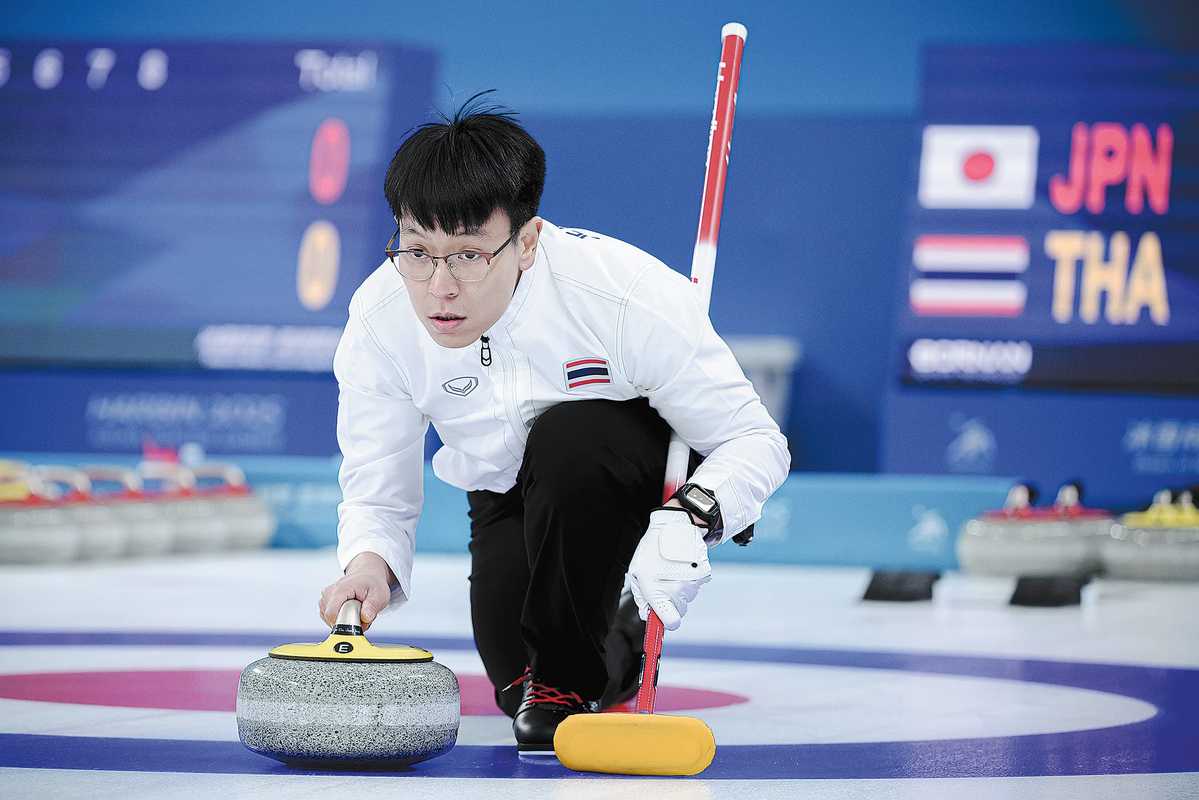
Cambodia's maiden Winter Asiad campaign, featuring four teen snowboarders set to compete in the men's halfpipe, is expected to send home an encouraging message — wherever their athletes land in the high-flying discipline — said Vath Chamroeun, secretary-general of the National Olympic Committee of Cambodia.
"This is the first time for Cambodia, as a tropical and hot country, to have a team participate at the Asian Winter Games," Chamroeun told Xinhua.
The country's participation has echoed the vision of the International Olympic Committee to engage more countries and regions with hot weather, or without snow and ice, in winter sports, he added.
With the next Asian Winter Games to be held in Saudi Arabia in 2029 at Trojena, a resort situated at the heart of the country's northwestern mountain regions, interest in promoting winter sports and related tourism businesses have piqued across the gulf nations.
Kuwait is one of the ambitious newcomers from West Asia that is determined to make some noise in Harbin with a 65-strong contingent of athletes.
"Our participation in Harbin will be Kuwait's largest since our debut in 1999," said Fahid Al-Ajmi, head of the Kuwait delegation.
Kuwaiti teams have undergone rigorous preparation at both domestic and international training camps, and they will compete hard to make their presence felt in Harbin, Al-Ajmi added.
Jasem Al-Awadhi, captain of Kuwait's ice hockey team, and a three-time Asian Winter Games veteran, reiterated that his teammates are all motivated to perform well on the continental stage.
"We are determined to secure victories and elevate Kuwait's standing, building on our thorough preparation," he said.
Contact the writer at sunxiaochen@chinadaily.com.cn
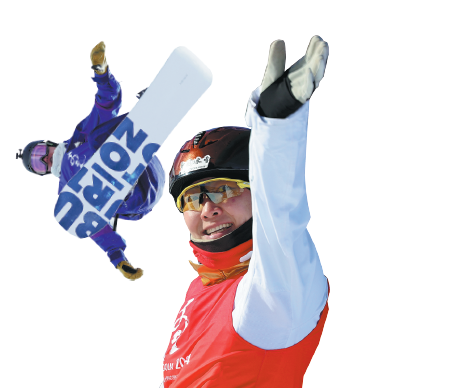
Chinese athletes are definitely the ones to watch in the snow sports events at the Harbin Asian Winter Games, which will be held in Yabuli, Heilongjiang province — particularly in freestyle skiing aerials, where Xu Mengtao and Qi Guangpu will be looking to add to their Beijing 2022 Olympic golds.
Four-time Olympic medalist skier Xu is in good shape, winning gold in the women's aerials at the FIS Freestyle Ski World Cup in Lake Placid in US last month. As the most decorated aerialist in history, Xu has seven world championship medals and 30 World Cup victories alongside her Olympic achievements.
The Chinese team, comprising Xu, Li Xinpeng, and Sun Jiaxu — a combination of veteran experience and youthful talent — also claimed gold in the mixed team aerials in Lake Placid. Xu and Li are also likely to take part in the mixed team aerials event in Yabuli.
Also in January, Qi snatched two golds at the FIS Freestyle Ski World Cup event in Lac-Beauport, Canada.
"Everyone knows that I'm not that young anymore," the 34-year-old said. "The younger guys are constantly pushing me, but I just keep working.
"I'm always ready for the competition. I'll keep going."
Chinese freestyle skiing superstar and Olympic gold medalist Gu Ailing announced her withdrawal from the Games due to a series of recent injuries.
Gu said on social media platform Weibo that she suffered a "severe contusion" after a fall in the freeski street event at the 2025 Winter X Games in Aspen, Colorado, last month. In her post, she also revealed that she sustained another injury during a recent training session, which forced her to pull out of the competition.
This means that China's two-time Olympian Zhang Kexin will single-handedly take on its continental rivals in the women's freeski halfpipe competition — and that anyone has a chance to snatch the gold.
In the Big Air event, Liu Mengting will fly the flag for the host after capturing her first FIS Freeski World Cup victory in Klagenfurt, Austria, last month.
Liu made a personal breakthrough with a total score of 170.60 points. It was just the second Big Air victory for a Chinese freeskier, after Gu's triumph in Steamboat, Colorado, back in December 2021.
Meanwhile, Chinese snowboarders are also keen to carve out a legacy on home snow.
Veteran Chinese snowboarder and Harbin native Cai Xuetong said her goal is to top the podium in front of her home crowd.
Cai made her Winter Olympic debut in Vancouver, Canada, in 2010 in the women's halfpipe event as the youngest athlete in the competition. She has continued to improve over the years, securing halfpipe gold at the FIS Snowboard World Championships in Kreischberg, Austria, in 2015, in Sierra Nevada in the US in 2017 and Bakuriani, Georgia, in 2023.
Cai's best performance at the Asian Winter Games, however, came in 2017 in Sapporo, Japan, when she claimed silver.
She will be up against Beijing 2022 bronze medalist Tomita Sena and Shimizu Sara of Japan.
Shimizu, 15, was crowned the Grand Prix champion at Copper Mountain in the United States in December, while Cai finished in second place.
On the men's side, Chinese snowboarder Wang Ziyang, who went viral online after executing a breathtaking triple front flip in the men's snowboard knuckle huck at the 2025 X Games in Aspen, Colorado, will compete in the men's snowboard halfpipe.
The victory not only secured Wang his first X Games title, but also made history, as he became the first Chinese athlete to win the event. The world is now looking in his direction, waiting to see what new tricks he has up his sleeve in Harbin.
He'll be facing off against Japan's Yamada Ryusei, who won halfpipe bronze at the Toyota US Grand Prix in Aspen a week ago, putting him firmly in the "favorites" column for the gold in Yabuli.
cuijia@chinadaily.com.cn
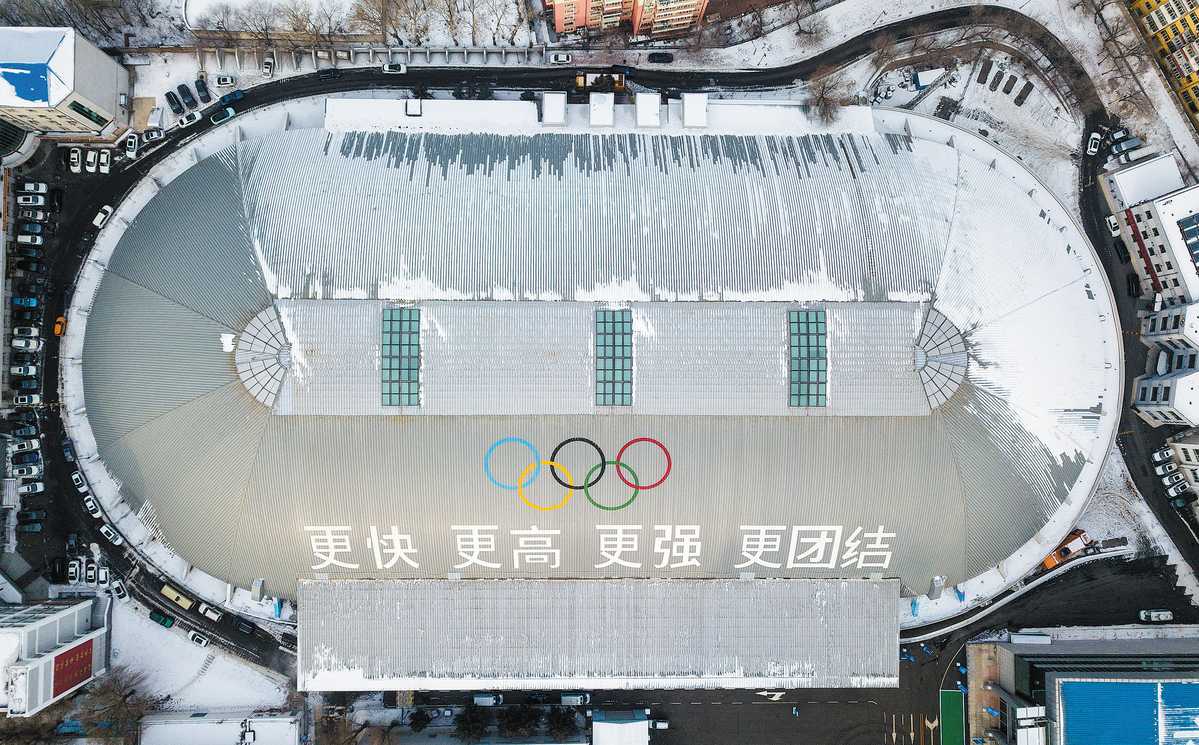
They may be small in numbers, but some emerging delegations from Asia's hottest or driest regions are huge in ambition, and they're raring to make their presence felt on the ice and snow in Harbin, Heilongjiang province.
Take the Philippines, for example, which just won a mixed doubles round-robin match against South Korea in early competition of the 9th Asian Winter Games in Harbin.
Few, if any, would have picked curling debutants Kathleen Dubberstein and Marc Pfister over the top-ranked South Korean duo of 2018 Olympic silver medalist Kim Kyung-ae and teammate Seong Ji-hoon.
However, Dubberstein and Pfister proved the pundits wrong on Tuesday in Harbin by upsetting the title favorites 12-6 on the first day of the Asian Winter Games' curling tournament, kicking off a three-win streak in Group B, until their first loss to host China on Wednesday.
Due to their lengthy competition schedules, ice hockey and curling got their round-robin stages underway days before the Games' official opening ceremony on Friday. The Games will run through Feb 14.
Representing a national program that was established just two years ago, the Philippine duo took pride in turning heads in Harbin, and they minced no words about their ambitions.
"If we can get a medal for the Philippines, that would be great," said Dubberstein, who will lead the Philippine delegation into the opening ceremony as its flag bearer, alongside short-track speed skater Peter Groseclose.
"But we are a new team, so we will work on our team dynamics and shot-making to improve our performance," Dubberstein added.
Like many tropical nations, the Philippines is embracing ice-based sports, particularly curling, in a bid to establish itself in winter sports. Half of the country's 20 athletes in Harbin are curlers.
Jarryd Bello, secretary-general of Curling Pilipinas, told the Philippine Daily Inquirer, "We are definitely the underdog team here, but our athletes are here to compete and they are proud to represent the country."
With more countries and regions from Southeast and West Asia joining in, the Harbin edition of the Winter Asiad, which features a record number of 34 participating delegations, has witnessed the expansion of winter sports in Asia.
Cambodia and Saudi Arabia are both making their Games debut in Harbin, while more than 10 countries and regions from Asia's usually snowless areas, including Thailand and Kuwait, will be competing in a wider range of sports than at previous Games.
Thailand, a continental power in summer events, such as soccer, badminton and golf, is committed to promoting winter sports as well, in a bid to help diversify its leisure and tourism sector, said Yuthaya Cheenheet, director of the Elite Sports Development Department of the Sports Authority of Thailand.
"We are a hot country; we don't have snow and we don't have a winter sports training center yet. But we need to develop our winter sports to try and catch up with international standards," Cheenheet said at Beijing Capital International Airport on Wednesday before boarding a flight to Harbin.
"I totally agree that it's a good move to expand winter sports, particularly ice events at indoor facilities, to some tropical countries as well, because it's helpful for developing an economy around sports and tourism," he added.
A record number of 87 Thai athletes have signed up to compete in six sports at Harbin 2025, with some set to make surprising appearances in altitude events such as ski mountaineering and alpine skiing.
Cambodia's debut Winter Asiad campaign, featuring four teen snowboarders set to compete in the men's half-pipe, is expected to send home an encouraging message, no matter where their athletes land in the high-flying discipline, said Vath Chamroeun, secretary-general of the National Olympic Committee of Cambodia.
"This is the first time for Cambodia, as a tropical and hot country, to have a team participate at the Asian Winter Games," Chamroeun told Xinhua News Agency. The country's participation reflects the vision of the International Olympic Committee to encourage more countries and regions that have hot weather, or are without snow and ice, to participate in winter sports, he added.
With the next Asian Winter Games to be held in Saudi Arabia in 2029 at Trojena, a resort situated in the heart of the country's northwestern mountain regions, interest in promoting winter sports and related tourism businesses has been piqued across the Gulf nations.
Kuwait is one of the ambitious newcomers from West Asia that is determined to make some noise in Harbin with a 65-strong contingent of athletes.
"Our participation in Harbin will be Kuwait's largest since our debut in 1999," said Fahid Al-Ajmi, head of the Kuwaiti delegation. Kuwaiti teams have undergone rigorous preparation at domestic as well as international training camps, and they will compete hard to make their presence felt in Harbin, Al-Ajmi added.
Jasem Al-Awadhi, the captain of Kuwait's ice hockey team and a three-time Asian Winter Games veteran, said, "We are determined to secure victories and elevate Kuwait's standing, building on our thorough preparation."
sunxiaochen@chinadaily.com.cn
